#(except in like the UK probably for this particular example?)
Explore tagged Tumblr posts
Text
the other day customer’s surname was “Godwin” and it pains me that “oh like Harold Godwinson-“ is not something I can just say at work
#not at this job- but at Faire I probably could XD#told my coworker and she didn’t even know what the bayeux tapestry is#moments where I’m reminded my knowledge base is a tad unusual#(except in like the UK probably for this particular example?)#the mermaiden speaks
1 note
·
View note
Text
rambling rant ahead
so I've rewatched Bucky's nightmare from tfatws for the first time since it came out and I have just a single issue with it. 'cause like, most of it is really good, I love the shot at the beginning to show a shadow across the ceiling, love the stunt work, love the shot on the stairs, but here's the thing...
throughout the winter soldier and civil war, his assassinations are silent, right? with the exception of when he's talking to his handlers in the winter soldier, telling them to focus on Steve while he goes after Natasha. this benefits HYDRA in the story being told--because if he's sent after someone who could recognise him, they can't recognise him from his voice--and it benefits the winter soldier as a character because someone who turns up, assassinates people, and leaves while being silent is more intimidating, right? it's why some people talk a lot, to seem more friendly because silence is seen as unfriendly or something? I know it's a stereotype about the UK, that we're stand-offish and unfriendly because we don't start conversations with random strangers, but I don't understand the issue. idk.
me point is, why the fuck would HYDRA decide, 'hey, you know our efficient weapon whose entire job is 'get in, kill, get out'? yeah, let's tell him to say 'hail hydra' to a corpse!'? a knife doesn't start telling you to vote for the fuckin reform party! a gun doesn't say 'maga'! what the fuck is this?!
'ah yes, the rogue science division of the nazis who, throughout the films, have been shown to view the winter soldier in a dehumanised way with a particular emphasis on him being a weapon and who seem to consistently remind him of the fact that his life is worth nothing (the pistol on the table during the winter soldier, the way he was probably taught to jump off things in a generally unsafe way that doesn't break his legs because of the serum, the entire last fight where his survival is less important than finishing his mission, for some examples)? they seem like the sort that want said weapon to speak.' in what fucking world? not the one that we were watching for a decade, that's for sure.
I have several issues with most things post-civil war and they all relate to nonsense lore choices that surely would have come up earlier just suddenly appearing and never being focused on. like, when did HYDRA decide that their toy shouldn't speak? I want that story. because Pierce had to hit him to make him speak in the winter soldier. we didn't forget about one of the most emotional scenes in the entire goddamn film, marvel. get yer shit together. my god.
#ooc#ramble#rant#mentions of physical abuse#lbr that's like half of my bucky portrayal#tw: physical abuse
3 notes
·
View notes
Text
Something that really fascinates me is the concept of “American words”. You know, words that US Americans associate with the USA, and the pandering way in which this used. I’m specifically looking at this in the context of trains.
For the longest time, with very few exceptions, the rail industry has used numeric or alphanumeric codes to refer to vehicles. Some trains got nicknames, but for the most part, you talk about SD40-2 and GG1 and GP9 and Re 4/4 II and 141R and F40PH and LNER A4 and class 95 and V100 (east) and DD 16 and BB 15000 and what have you. Stuff that makes you sound crazy to any non-railfan, and that’s how we like it. None of these are made up, by the way, I have all of them in my model railroad collection (the 141R is new).
That’s because this is all a strictly business-to-business thing. Nobody buys a particular locomotive, car or train because of the great name or advertisement, they do it because they ran the numbers and a lot of negotiating.
Over the years, however, that shifted. The first major time (apart from a few one-off named trains) in the US was probably the General Electric P40, P42 and P32, collectively known as “Genesis”. That’s already a fairly “American” word: Explicitly biblical, which is less popular in Europe (let alone other parts of the world), and it sounds meaningful: Something something start, new beginning. The locomotive is the beginning of the train, anyway, so it’s not like it’s wrong.
In Europe, we’ve seen this in full force during the 90s and especially 2000s, together with a huge shift in how railroading worked at all. Before, it used to be that the rail industry of one country got together with the country’s main railroad, and designed one locomotive together, and everyone got to build at least parts of it. A lot of mergers and liberalisation of the rail market means that nowadays, the rail industry is organised as multinational corporations (I’d say four major ones at the moment, but I won’t say which ones so nobody gets angry at me for saying the wrong ones), and these design the trains in house and then try to sell them, with real marketing departments and such.
For example, in the 80s and early 90s, there was exactly one regional diesel train that was being built in Germany, the class 628. It was only built for Germany (mostly, a few ended up in Luxembourg), too. Other countries had very similar trains, notably the Netherlands and Austria, which were derived from the German design and built under license, but by their own local rail industry to their own standards.
On the other hand, by 2000, in the same market (but now low-floor for better accessibility and climatized), we had things like the class 642, 643, 646 and 648, and that’s not counting the weird ones (such as the shorter 640, 641 and 650) or the ones only sold to private companies. All of them did the same thing, but all of them were built by different companies (Siemens, Bombardier, Stadler and Alstom in order), and all of them were also exported, unchanged, to many other countries around the world. Even North America got a small set of each of these types.
And since there were many, it was decided that marketing was now in order. These trains no longer only had class numbers from the railroad that ordered them; instead they got names from their manufacturers. In those cases, Coradia LINT, TALENT, GTW and Desiro, and there were also RegioShuttle, RegioSprinter and Itino, and yes I am missing some on purpose.
Throughout the 2000s, all manufacturers adopted this for almost all trains and locomotives. So let’s talk about the names in particular.
First thing: Names are expensive, so they get reused. You will find Siemens Desiro trains in Germany, Belgium, the UK and Malaysia (among others), and those have nothing to do with each other except for being regional trains built by Siemens. In fact, there are two or three completely different types of Desiro in Germany alone (the Desiro ML and HC are not completely different, but they’re hardly the same thing either). They are generally delineated by suffixes, like Desiro Classic, Desiro ML, Desiro HC, or Coradia LINT and Coradia Stream and many others.
Second: Names are generally abstract made-up words. It’s okay if they sound a bit English or are English, but they’re generally meaningless. Desiro, Coradia, TRAXX, Vectron, Talent, Velaro, Avelia, Urbos, Flexity, Civity, Mireo, those are all names that vaguely imply something but mean nothing in particular and are specifically chosen to be inoffensive everywhere.
The big exception to this is Stadler, who uses funny (to them) abbreviations. Their line-up includes TANGO (tram), WINK (local train), FLIRT (regional train), KISS (double-decker regional and intercity train), and for their high-speed long-distance train… SMILE. I’ve said it before and I’ll say it again: They’re cowards.
So let’s come back to North America. The passenger rail industry there has been in a zombie state for a long time, and it seems like the freight industry is starting to join them. The market is too small to really have a domestic industry, so with very few exceptions, all modern trams, subways, locomotives and complete train sets are European designs, adapted for the US market, but assembled in the US due to federal laws.
And they all get names for the specific North American variant, and this name is always what I’d call an “American word”:
Europe: Siemens Vectron DE (diesel locomotive). North America: Siemens Charger
Europe: Citadis (tram). North America: Citadis Spirit
Europe: Flexity 2 (tram). North America: Flexity Freedom
Europe: Avelia Horizon (high speed train). North America: Avelia Liberty
There are still some exceptions, like the ALP45DP whose name is as gloriously ugly as the locomotive itself, but the trend is clear.
Just today, and the reason why I’m posting this, we got my favorite example. The company behind the privately owned and operated high speed line between (the suburbs of) Los Angeles and Las Vegas is currently looking at which trains to buy, and Siemens has released an official proposal. It’s based on their Velaro high speed train, specifically the Velaro Novo that’s conceptually a cross between the ICE 3 (new) and ICE 4 (remind me to write a post about ICE types and their bonkers numbering one of these days), and for a long time it has only been communicated as such. But their competitor has the much more American name Avelia Liberty (also known as the new Acela by its operator Amtrak - interestingly Acela would be a perfectly good European train name). So they needed to not only build a better train, they also needed to out-american them on the name. Apparently.
Enter the American Pioneer 220.
Now that’s an American name! Velaro Pioneer would have been a very American name already, but Siemens really wants that contract, so they put American in front, just to make it absolutely clear that they’re not planning to sell this one to Iceland. The 220 stands for its top speed of 354 kilometers per hour, of course, which it won’t reach on the proposed line.
So what is an “American” word here? I’d say it’s anything you can have as a keyword in a speech about how great and unique the US is. In the list above, we have Freedom, Freedom but in Latin, Spirit, Charger and now Pioneer.
For more similar names, I think the space program provides great opportunities. All Space Shuttles and Mars rovers have great American names. Anything that sounds like can-do attitude, overcoming, exploring new grounds, being super-free and perhaps vaguely metaphysical can do the job. Opportunity. Constitution. Eagle. Flag. Banner. Crossroads. Star. You can just go on.
I suppose/hope we’re not getting any trained named Columbia anymore, but I do hope Destiny is still in there and that Stadler gets in on this act, because a train named KISS Destiny would be absolutely hilarious.
I think there’s like a 5% chance of someone coming in my notes and saying that this is necessary and good because the US are so full of freedom and liberty and work-ethic and so on that the Europeans could never understand. I don’t think it’ll happen, I’ve made the post far too long for anyone to read through to the end, but you know, if it does: I don’t really agree with that. But it is true that US Americans like to believe that about themselves, and so if you want to pander to them, these words work wonders.
As a non-american who has spent less than three months in the US in total, I am not an expert on this or in fact anything I’m saying here, but I also personally blame George Bush and the Iraq War, and the rise in mandated patriotism that came with that. Of course the land of Freedom Fries also gets the Trainionity Freedom. See also how many US trains now have American flags on them, including many that were built fully in Germany or Switzerland. That’s a relatively recent thing.
2 notes
·
View notes
Note
Do you have any thoughts on the use of AAVE for Nile (or lack thereof) in TOG fanfiction? I've been reading some Book of Nile fic and some writers seem to write her as a Millennial™ (using words like "fave" and "woke") but never acknowledge her Blackness in her patterns of speech. I know we don't see her use as much AAVE in the films, but I would argue she's in situations where code-switching would be valued (first in a "professional" environment in the army, then around a group of non-Black strangers).
Hi anon! I have many thoughts on this and I'm honored you asked me! But I should start by saying I'm white and any thoughts Black fans and especially Black American fans have on this that they want to share would be beyond lovely. (I'm not gonna tag anybody bc that feels rude but please add onto this post if any of y'all see this and want to!)
The main reason I personally avoid AAVE for Nile in my own fics is because I'm not Black. But Nile-centric fics by Black writers tend to avoid using much of it too, at least from what I've noticed/understood, and my guess is it's largely for the reason you mention, that she's in situations that encourage code-switching.
In movie canon Nile is highly competent at tailoring her language to each situation she finds herself in. This fantastic linguistics analysis meta shows how skillfully Nile chooses her vocabulary and grammar to meet her goals with different conversation partners in different contexts. In comics canon Nile had a bunch of different civilian jobs before joining the Marines, so she would've had experience code-switching in the ways that made sense for all those different contexts as well as the Marines and her family and high school and wherever else she spent her time before we met her. And now she's spending her time with a handful of immortals none of whom are native English speakers and a fellow Black American but one with a Queen's English UK accent whose professional experience is in the CIA where high-status code-switching is often an absolute must for success or even survival.
Fics featuring Nile are charged with extrapolating from that to how it might show up in her use of language that she's coping with a traumatic separation from her family and her career and pretty much everything she's ever known and now she needs to be able to make herself understood to people who seem to care about her and each other but are super duper in crisis, three (soon to be four) of whom predate Modern English entirely and the only one who's anywhere near her contemporary she's not supposed to talk to for a century. All of these people are telling her that pretty much any contact with any mortals poses an existential threat to her and the rest of the group. How the FUCK is she supposed to cope with that, like, generally? And would it be a more effective way for her to cope if she talked to Andy Joe and Nicky using the speech patterns that she used to use with her mom and brother, to at least retain that part of her identity even if it means having to do a lot of explaining, or would it meet her needs better to prioritize Andy Joe and Nicky understanding what she means with her words over using the particular words and grammar forms she used with her family?
I've seen several fics, both Nile-centric / BoN and otherwise, explore this a little bit in how/whether Nile uses Millennial™ speak. It's often a theme in Nile texting Booker despite the exile because of the popular headcanon that he as The Tech Guy is the only other immortal who understands memes. But Nile's much-younger-than-Booker mom probably uses Boomer and/or Gen X memes and Andy has been adapting to new communication styles for forever as evidenced by her canon high level of fluency with standard-American-accented English.
Which brings us back to people avoiding AAVE because they're not Black and they don't want to make mistakes (or they're not Black and they don't want to get yelled at for making mistakes, though I think many people overestimate how much they'll get yelled at while underestimating how much these mistakes can hurt). I can imagine some Black fans hold back from using much AAVE in fic because they don't want to share in-group stuff with white people who are likely to then adopt and ruin it, as white people so often do with Black cultural stuff. Some links about this including a great Khadija Mbowe video. I'm saying this gently, anon, because you might not know: woke, an example you cited as Millennial™ speak, is AAVE, and that's gotten erased by so many white people appropriating it and using it incorrectly online.
And also there's the part where fandom is a hobby and you never know when you're reading a fic that's the very first thing someone's ever written outside of a school assignment. This cultural considerations of language shit takes a level of effort and skill that not everybody puts into every fic, or even could if they wanted to because they haven't had time to build their skills yet. It's definitely easier for non-Black fans to project our millennial feels onto Nile than to do the layers of research and self-reflection it requires to depict what Blackness might mean to Nile, and it's not surprising that often people sharing their hobby creations on the internet have gone the easier route. There's not even necessarily shame in doing what's easier. It's just frustrating and often hurtful when structural white supremacy means that 3-dimensional Black characters are rare in media and thoughtful explorations of them in fandom are seen by the majority of fans as not-easy to make and therefore Nile Freeman, the main character in The Old Guard (2020) dir. Gina Prince-Bythewood, has the least fic and meta and art made about her of our 5 main immortals.
I've been active in different fandoms off and on for twenty years and I barely managed to write 5,000 words about Sam Wilson across multiple different fics in the 7 years since I fell in love with him. There's an alchemy to which characters we connect with, and on top of that which characters we connect with in a way that causes us to create stuff about them. Something about Nile Freeman finally tipped me over the edge from a voracious reader to a voracious writer. It's not for me to judge which characters speak to other individuals to the level of creating content about them, but I do think it's important for us to notice, and then work to fight, the pattern where across this fandom as a whole Nile gets way less content, and way less depth in so much of the content that's in theory about her, than any of these other characters.
Anyway, back to language. My two long fics feature Nile with several Black friends — Copley and OCs and cameos from other media — but all of those characters except Alec Hardison from Leverage aren't American. It's very possible I'm guilty of stereotyping Black British speech patterns in I See Your Eyes Seek a Distant Shore. I watched hours and hours of Black haircare YouTube videos in the research for that fic and I modeled my OCs' speech patterns on what I heard from some of those YouTubers as well as what I've heard people like John Boyega and Idris Elba saying in interviews, but the thing about doing your best is you still might fuck up.
I'm slowly making progress on my WIP where Nile and Sam Wilson are cousins, and what ways of talking with a family member might be authentic for Nile is a major question I need to figure out. For that, I'm largely modeling my writing choices on how I hear my Black friends and colleagues talking to each other. I haven't overheard colleagues talking in an office in a long-ass time, but back when that was a thing, I remember seeing a ton of nuance in the different ways many of my Black colleagues would talk to each other. Different people have different personalities! And backgrounds! And priorities! A few jobs ago my department was about 1/3 Black and we worked closely with Obama administration staff many of whom were Black and there was SO MUCH VARIETY in how Black people talked to each other, about work and workplace-appropriate personal stuff, where I and other white coworkers could hear. There are a few work friends in particular who I have in my head when I'm trying to imagine how Sam and Nile might talk to each other. From the outside looking in, God DAMN is shit complicated, intellectually and interpersonally and spiritually, for Black people who are devoting their professional lives to public service in the United States.
One more aspect of this that I have big thoughts on but I need to take extra care in talking about is the idea of acknowledging Nile's Blackness in her patterns of speech. There's no one right way to be Black, and Nile's a fictional character created by a white dude but there are plenty of real-life Black Americans who don't use much or even any AAVE, for reasons that are complicated because of white supremacy. (Highly highly recommend this video by Shanspeare on the harms of the Oreo stereotype.)
Something that's not the same but has enough similarity that I think it's worth talking about is my personal experience with authenticity and American Jewish speech patterns. My Jewish family members don't talk like they're in The Marvelous Mrs. Maisel, and I've known lots of people who do talk that way (or the millennial version of it), some of whom have questioned my Jewishness because I don't talk that way. That hurts me. Sometimes when another Jew tells me some shit like "I've never heard a Jew say y'all'd've," I can respond with "well now you have asshole, bless your Yankee-ass heart," because the myth of Dixie is a racist lie but I will totally call white Northerners Yankees when they're being shitty to me for being Southern, and this particular Jew fucking revels in using "bless your heart" with maximum polite aggression, especially with said Yankees. But sometimes I don't have it in me to say anything and it just quietly hurts having an important part of me disbelieved by someone who shares that important part of me. The sting isn't quite the same when non-Jews disbelieve or discount my Jewishness, but that hurts too.
Who counts as authentically Jewish is a messy in-group conversation and it doesn't really make sense to explain it all here. Who counts as authentically Jewish is a matter of legal status for immigration, citizenship, and civil rights in Israel, and it's my number 2 reason after horrific treatment of Palestinians that I'm antizionist. But outside that extremely high-stakes legal situation, it can just feel really shitty to not be recognized as One Of Us, especially by your own people.
It can also feel really shitty to be The Only One of Your Kind in a group, even if that group is an immortal chosen family who all loves each other dearly. Sometimes especially in a situation like that where you know those people love you but there are certain things they don't get about you and will never quite be able to. I'm definitely projecting at least a little bit of my "lonely Jew who will be alone again for yet another Jewish holiday" stuff onto Nile when at the end of I See Your Eyes Seek a Distant Shore she's thinking about being the only Black immortal and moving away from the community she'd built with a mostly-Black group of mortals in that fic. Maybe that tracks, or maybe that's fucked up of me.
Basically, this got very long but it's complicated, writing about experiences that aren't your own takes skill which in turn takes time and practice to build, writing about experiences not your own that our society maligns can cause a lot of harm if done badly, it can also cause a lot of harm when a large enough portion of a fandom just decides to nope out of something that's difficult and risky because then there's just not much content about a character who deserves just a shit ton of loving and nuanced content, people are individuals and two people who come from the exact same cultural context might show that influence in all kinds of different ways, identity is complicated, language is complicated, writing is hard, and empathy and humility and doing our best aren't a guarantee of avoiding harm but they do go a long way in helping people create thoughtful content about a character as awesome and powerful and kind and messy and scared and curious and WORTHY as Nile Freeman.
#nile freeman#linguistics#TOG POC Love Fest#nileweek2021#tog meta#tog#long post#mine#antiblackness#jewish things#hi i'm an antizionist jew no i don't really want to talk about it
231 notes
·
View notes
Text
Supplementary survey: they/them reflexives, The Sir/Ma’am Issue, and Spivak vs. Elverson
This short, clarifying survey ran from 4th until 24th April 2021. There were 2,998 usable responses. Unlike the annual Gender Census survey, this one was open to anyone of any gender, provided they lived in an English-speaking country.
It asked about two things:
They/them verbs and reflexives - basically whether people who prefer they/them pronouns prefer the reflexive to be themself or themselves, and which people feel is more “correct”.
Sir/ma’am/? - investigating why people use sir/ma’am in areas where it’s polite and common to do so, and whether there are any viable nonbinary or gender-neutral alternatives.
This blog post will also investigate the Spivak vs. Elverson issue, which was actually a separate poll that took place on two social networks.
~
THEY/THEM VERBS AND REFLEXIVES
Someone asked about themself vs. themselves, and it reminded me of some of the they/them issues that people ask about in feedback boxes and various confusions surrounding them.
Singular they - what is it, and when and how do people use it?
Plural they - what is it, and when and how do people use it?
What is the “correct” reflexive for each of these?
You can see the statistics in more detail here, but here’s the graph as an overview:
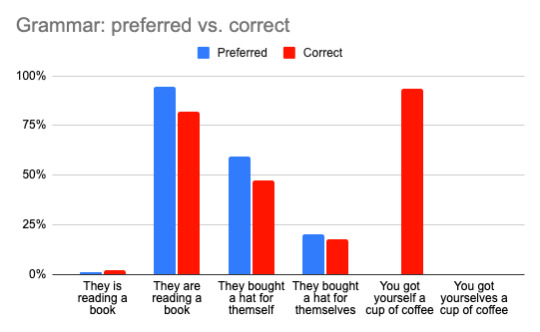
Participants were asked a series of questions about singular they pronouns. Everyone was asked a “which is correct” question, and participants who sometimes or always like to be called ”they” were also asked about their personal preferences.
The graph is a view of only participants who sometimes or always like to be called “they”.
Verbs. As you can see, participants overwhelmingly (94.3%) wanted people to use plural verbs (”they are reading a book”) when talking about them in the third person - even though the percentage of people who thought that was the most “correct” form was a little lower (81.8%). This was lower because 11.4% of participants who preferred “they” answered “both are correct”.
Reflexives. People were much more likely to say that both themself and themselves were correct (28.3%), and more likely to have no preference between the two (17.4%). However, themself was still more popular overall at 59.3%, and 47.3% thought themself was grammatically correct.
You as a control. I also asked all participants whether yourself or yourselves was more correct when addressing one person as a kind of control question, because they is almost grammatically identical to you - it can refer to one person or multiple people, it takes plural verbs even when referring to/addressing one person, and in that situation only the reflexive changes. Many people who say that singular they is grammatically incorrect have no issues with singular you, so it seemed like something that might be interesting to compare. In the graph above you can see that 93.6% of people thought yourself was more correct; only 4.2% of they-accepting participants felt that both yourself and yourselves were equally correct when addressing one person.
There were a couple of things that came up several times in the comments:
“They is” is common in African-American Vernacular English (AAVE), and probably in other dialects too. As I don’t live in the US I’m pretty unfamiliar with this dialect, but either way that seems fine to me. It’s part of why I also asked for participants’ locations, because I wanted others to be able to download the results and see if some regions were more likely to use some words/constructions than others.
There were some alternatives to themself and themselves presented, such as theirself and theirsen. Both of these points lead nicely to the third...
The idea that any language choice is more “correct” than another is quite prescriptive. What feels correct or natural varies depending on a lot of factors, such as where in the world you learned English, and there is no such thing as objective correctness when it comes to such a broad and variable language as English.
I am aware of and agree with that third bullet point, so my asking which phrases were more “correct” was a bit of a trick question. It was a good way to get a feel for people’s linguistic instincts.
I also thought it was interesting that participants who never wanted to be called they were slightly more likely to side with the most popular view on what is “correct” across the board, and less likely to say “both are correct”.
~
PLURAL VS. SINGULAR THEY
I actually ran another version of this survey first and then scrapped the responses, because it was clear that my survey design was leading to some pretty confused and unhelpful data! Among other things, it asked participants whether they preferred singular or plural they for themselves and then directed them to particular questions based on their answer, and the comments suggested that people either didn’t really understand the distinction or meant different things by those terms, even though I had added help text.
This is my understanding:
Singular they is they/them pronouns when used to refer to one person. Verbs are usually plural (i.e. “they are” rather than “they is”), and themself and themselves are both common. Example usage: They are getting themself a cup of coffee. They bought themselves a nice new hat.
Plural they is they/them pronouns when used to refer to two or more people. Verbs are usually plural (i.e. “they are” rather than “they is”), and themselves is almost universal (with the exception of regional variations such as theirselves). Example usage: They are getting themselves some coffee together. They all bought hats for themselves.
Some plural/multiple people refer to themselves as “we” and prefer to be addressed as “they/themselves” (which they call plural they) because they are a group of individuals sharing one body.
The reason I initially asked directly about singular vs. plural they is because I was concerned that plural/multiple systems would cause some statistical confusion. Many plural people have asked me to add plural they to the checkbox list of pronouns in the annual survey, but since it has never been entered by over 1% of participants I have never had reason to do so. As far as I knew, the only difference between singular and plural they is the reflexive (themself for singular and themselves for plural), so I wanted to be able to investigate non-plural people in isolation, and I was curious to know about any trends or differences. I wanted to find out if I should be doing anything differently to ensure that Gender Census statistics are helpful.
So, I swapped out the badly-designed question for a straight-up checkbox, a “check this box if you’re plural/multiple” type of thing, with a note that participants should fill in the survey once per body wherever possible, and then I made some graphs.
Here you can see that plural systems were still more likely to prefer people to use themself to refer to them rather than themselves, though the margin is narrower:
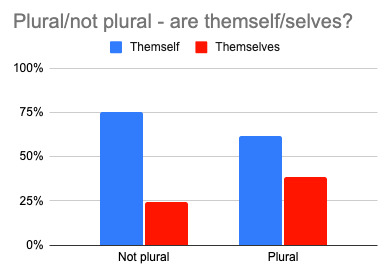
Plural participants were also more likely to say that they sometimes or never want people to refer to them as they, whereas non-plural people were more likely to want people to always refer to them as they (or they just feel fine about it):

There’s not a lot in it, though. It’s all relatively evenly distributed, with no strong leader in either category there.
For the curious: 8.2% of participants checked the plural/multiple box.
In conclusion: plural and non-plural people alike all prefer people to use themself when referring to them in the third person using they/them pronouns, and I feel that there is probably no need to ask about plurality or separate out data from plural people in future. (Asking about this and seeing the responses did in part prompt me to start an anonymous feedback form for plural participants of the Gender Census, though.)
~
THE SIR/MA’AM ISSUE
For several years participants have been asking me in the feedback box of the annual Gender Census survey to also ask about gender-inclusive or nonbinary-specific alternatives to sir and ma’am. I’ve largely not done anything about it, because when informally asking around I’ve generally had the response “just don’t say sir or ma’am, just leave it out altogether.” I live in the UK, where if someone calls you sir/ma’am you’re either looking at home in a fancy restaurant for billionnaires or you’re being made fun of - or sometimes both.
However, during this year’s annual survey while talking about it in a little more depth I learned that there are places in the world where sir/ma’am is very common, required for politeness, and basically inescapable. Nonbinary people in those areas are really struggling, because they do actually need a nonbinary-friendly stand-in for those terms - omitting the sir/ma’am isn’t an option.
Again, the location question was asked so that anyone else downloading the spreadsheet of responses can analyse by region to find out whether sir/ma’am is ubiquitous in particular regions and in which contexts it is used, and can even check whether there is a region-specific alternative to sir/ma’am emerging. I asked several questions about sir/ma’am, including about reasons/contexts and personal preferences, and some superficial analysis is included on the spreadsheet of responses.
But the juicy bit is the nonbinary-specific and gender-inclusive alternative words, right?
[The counting formula is case-sensitive so I made everything lowercase to make the count a little more accurate.]
Suggested gender-inclusive alternatives to sir/ma’am
mx - 4.1% (151)
friend - 2.2%
comrade - 1.2%
captain - 0.7%
ser - 0.5%
mate - 0.4%
m - 0.3%
per - 0.3%
boss - 0.3%
folks - 0.3% (9)
Suggested nonbinary-specific alternatives to sir/ma’am
mx - 8.3% (250)
mix - 0.7%
tiz - 0.5%
friend - 0.4%
ser - 0.4%
comrade - 0.3%
mixter - 0.3%
captain - 0.2%
ind - 0.2%
mir - 0.2% (6)
So it looks like Mx (pronounced “mix” or with a toneless vowel that sounds a bit like “mux”) is the clear winner in both categories. If you want to try to introduce a gender-neutral version of sir/ma’am in your area this one is probably your best bet.
~
SPIVAK VS. ELVERSON
This wasn’t part of the same survey! It was a Twitter poll and a Mastodon poll that ran for one week and ended today, and I’m putting it here because it has to go somewhere.
Sometimes people refer to the ey/em and e/em “versions” of the Spivak pronoun set, which makes my eyebrows do things, because they’re not both Spivak. They are distinct established pronoun sets with their own names.
Spivak - e/em/eir/eirs/emself - written about by Michael Spivak in the 1990s. [source: Nonbinary Wiki]
Elverson - ey/em/eir/eirs/emself - created by Christine M Elverson in the 1970s. [source: Nonbinary Wiki]
The Elverson set is older, but it’s less well-known for some reason, so they’re assumed to be variants of Spivak due to the similarity in spelling.
I was recently asked how we can know which is more popular, given the “oh this checkbox option is close enough, I’ll just choose that instead of typing in my very slightly different set” effect and the “hmm this checkbox option is very close to my set, I’m probably meant to choose this one” effect, plus the boost that checkbox options get with the “oh I hadn’t thought of that one but yeah, why not” effect. Spivak (e/em) is on the checkbox list of pronouns in the annual survey, so it appears to be much more popular than Elverson (ey/em)... but is it really?
I ran a poll on both Twitter and Mastodon, and then used a spreadsheet to extract the useful numbers. There were 141 relevant votes after one week. I wouldn’t usually make annual-survey-altering decisions based on a sample that small, but in this case the results are extremely decisive:
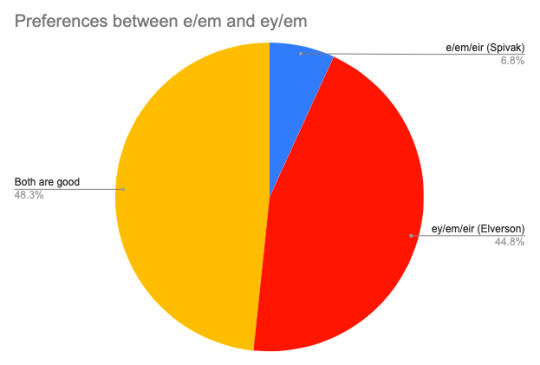
It seems that the highest proportion of people who like at least one of the sets are happy for both to be used, at 48%. 45% prefer ey/em (Elverson) and 7% prefer e/em (Spivak). This is pretty stunning! I’ve been presenting e/em (Spivak) as a checkbox option on the Gender Census annual survey for years, possibly since the first survey in 2013, and because it’s a checkbox option it seems to be consistently a lot more popular than ey/em (Elverson). That’s 4.3% and 0.6% respectively in the 2021 survey. But this poll suggests that actually ey/em (Elverson) is much more popular when the two pronoun sets are viewed on a level playing field.
When you remove all “I don’t mind” votes, you get this:
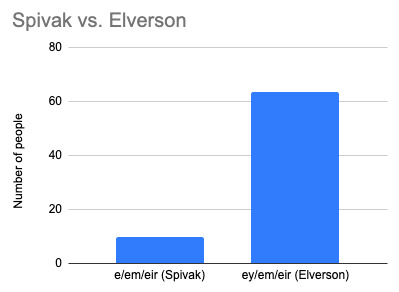
Over 6 times as many people prefered Elverson!
I will definitely be adding Elverson to the Gender Census next year, just so that we can split the e/em and ey/em votes and really get to the bottom of this.
Anyway, while we’re on the topic, ey/em takes singular verbs most of the time.
298 notes
·
View notes
Note
Dear Sparrow, You have really amazing analytical skills and your detailed knowledge about the Naturoverse is just as impressive! It's always so interesting to read your posts and I value your opinion a lot. Now to my question... How would a realistic romantic relationship between Naruto and Sasuke look like in our eyes?
I'm not really interested in knowing who is seme and who is uke, but what their couple dynamic would look like? What would be their struggles? What would they talk about?
For example, what if Naruto wanted a family and Sasuke didn't. Would Naruto -as a Hokage- be hesitating on sending Sasuke on dangerous missions? What are their plans for the future?
Or how would they search for/react to/display/intimacy? Would they stay closeted (like they kinda are in Boruto XD)? Or would they be openly gay and live with each other? How would each of them react to homophobia towards them? I'm curious about your head canon! ♥️
Thank you so much for your compliments @itsmischiefsblog 😍😍😍
But you asked the wrong person!!!! LOLOL.... I’ve never read any SNS fanfiction so far to even base my headcanon upon (except for 1 which had just 3 chapters and I just started 1 very recently)
But,
I can say you one thing.
As you know very well that I treasure SNS ship a lot, A LOTTTTTT..... So I won’t just compare this ship with anything so easily. And if I do, which means it’s really worthy. I came to ship SNS only because Naruto and Sasuke’s interaction always reminded me of this other Ship I loved a lot before watching Naruto.
And after finishing Naruto, I came to this conclusion that If Naruto and Sasuke were allowed to be together, then probably they will display their love very similar to the other Couple I loved. Because culturally they share the same value and the world is Ancient. Just like Naruto series has Chakra, they also have Spiritual Energy in their abdomen.
And also, the Couple shares the same dynamics with SNS... That is, One is a Bright, Cheerful, Messy, Prank loving Bubble and the Other is an Unexpressive, Stern, Elegant, Intense loving Heart-throb....
Oh by the way, in this Dynamics everything is similar to SNS except for One.... What happens if Sasuke stayed in the Light Path and Naruto went to the Dark Path??? What will Sasuke do for Naruto??
If that interest you, then this series will be for you.
I suggested this series to another SNS Blogger Friend of mine @seraphina-herondale ❤️❤️❤️❤️ Now she is Brainrotting and Gushing over this couple so badly.... Because they are very similar to SNS and has more Fluffs, many subtle Intimate moments and extremely good chemistry....
If you want to know my Head Canon.... You have to watch this series and I am sure you will never regret it!!!
Not to mention, Just like SNS has SNS toys, pens, mugs, perfumes and many other merchandise.... That couple also has a lot of merchandise and is extremely popular. It was based on a BL Novel and got adapted into Anime as well as Live Action Series... Live Action is what I am talking about.... It also has a Chibi Version of Anime as well....
Novel has all the ‘Hot’ contents towards the very end.... But Live Action has passed that couple off as Soulmates because of Censorship... But still the Show Creators had found a round-about way to make the couples Marry on-screen indirectly in our plain-sight.... LOLOLOL... Just like how Rikkudou Sennin made an unofficial Marriage for SNS....
If you ever decided to give this amazing series a try.... I suggest you to start with the Live Action, then Novel, Anime, Chibi-Anime.... In this particular order... Because Live Action has no Adult Contents and so Pure just like in Naruto Manga.... It will really make you gush over them a lot and then if you want to really know how they ‘Get together’, you can read the Novel linked here..[Link]
That series Name is The Untamed (Chen Qing Ling),based on the Novel named Mo Dao Zu Shi, available in Netflix, Viki Rakuten or in WeTV app. Please don’t google or Youtube to spoil yourself.... Just Go straight to Netflix and Watch it....
Anyways, I would like to provide you some Teaser in order to show you the similarities they share with SNS .... Just only few.... there are a lot actually...
BONDED UNDER THE MOONLIGHT
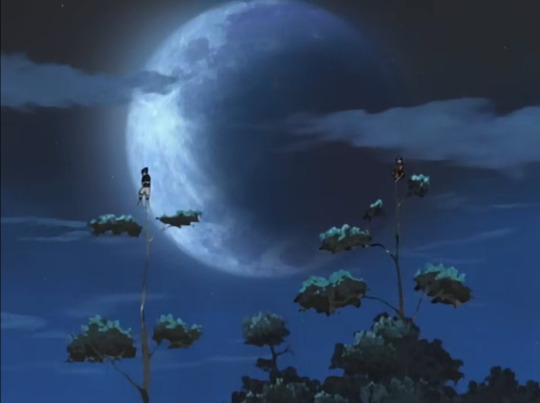
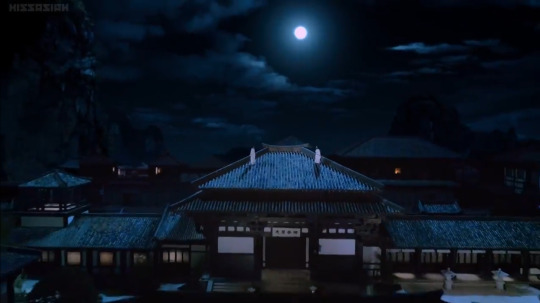
Both couples Bonded under the Moonlight... Actually The Untamed Showrunners mentioned in their interview that they decided to capture that scene under moonlight to provide a ‘Romantic Effect’..... LOL... Am sure Kishi must have thought that way way back in 1999..... 😍😍😍😍😍😍😍
GOOD MATCH

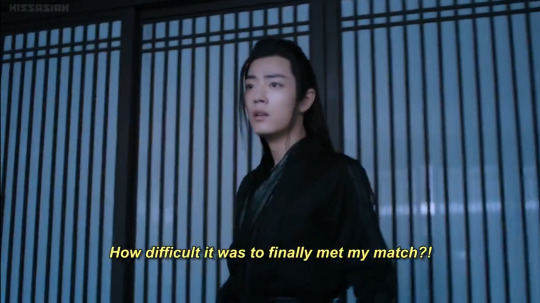
Both the characters are so happy over the fact that they found their ‘Match’.... ❤️❤️❤️❤️❤️❤️❤️❤️❤️❤️
WHO AM I TO YOU?
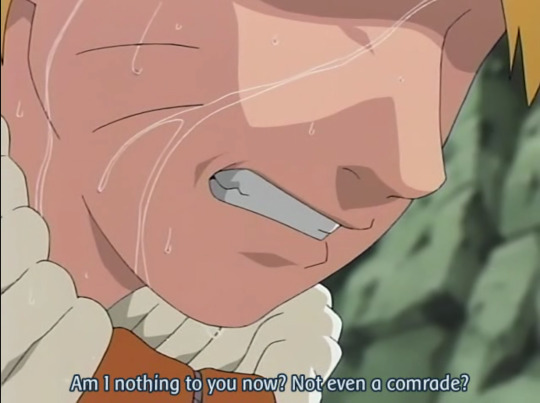
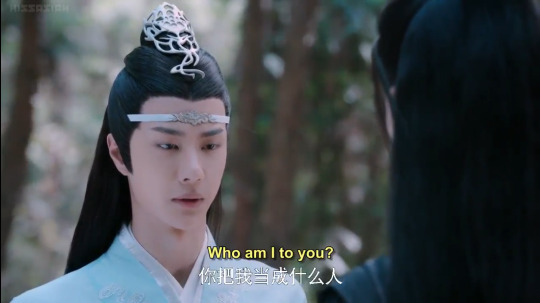
The situation is mindbogglingly similar... Naruto asked that Question when Sasuke is trying to avoid him and going towards that dark path.... This person also asks this same question when the other person was avoiding him and going towards Darkness....😔😔😔😔😔😔😔
OUTSIDERS
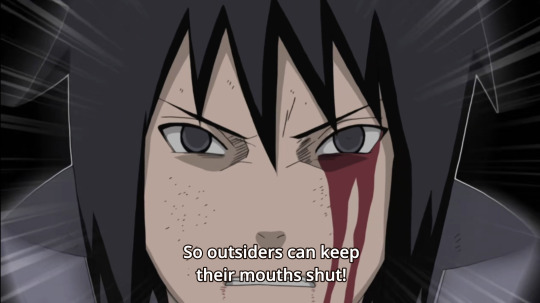

Both the respective characters, after getting into the Darkness, actively trying to push their Light.... By using the same term.... ‘Outsiders’..... Ooooof!!!!! ���💔💔💔💔💔💔
I AM TAKING YOU BACK TO...
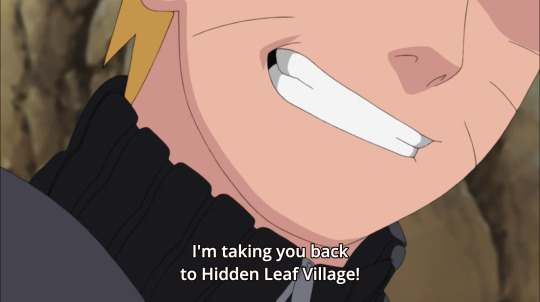
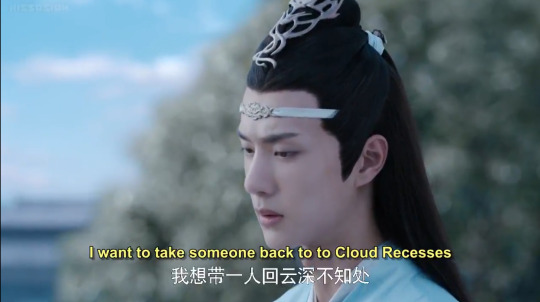
Both these characters represents Light... They want to take their Bae into the place where they live.... In Naruto, it’s Konoha (Leaf Village).... In The Untamed, it’s Gusu (Cloud Recesses)
CRADLING MY BAE
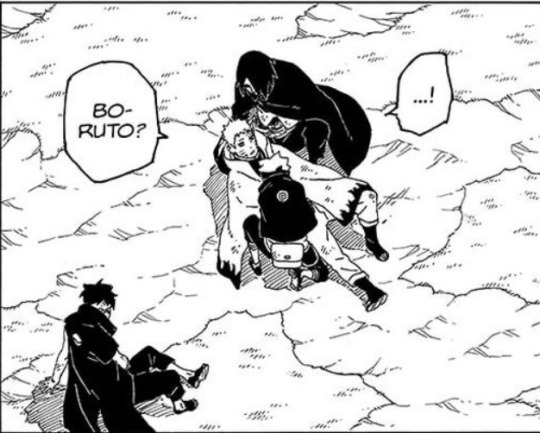

Aren’t they adorable, warm and tender?????
YIN AND YANG
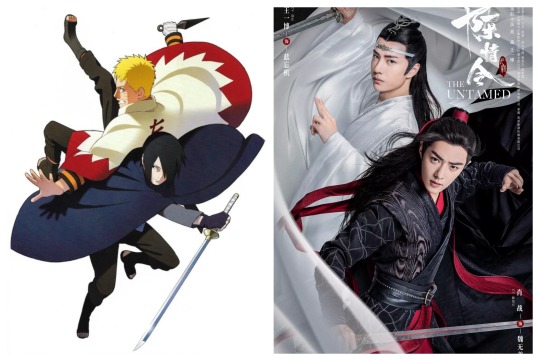
Just like how Sasuke represents Yin in Naruto.... The Person who is very similar to Naruto represents Yin in The Untamed.
Aren't they all similar????
So, Please don't google about this and try to watch it without any spoilers because the plot is equally captivating as our Main Characters’ chemistry.... Lots of Angst, Tears, Brotherly sentiment, Brother-Sister Bond, no annoying Female Characters.... And Don't just watch it for the fluff stuffs because the story and romance is like Yin and Yang... You really have to pay attention to the story to understand their Bond.
First 2 episodes might be hazy... because the story is Non-Linear... But don’t drop it.. Starting from Episode 3 you will really get into the Flashback and then later you will understand what First 2 episodes are all about...
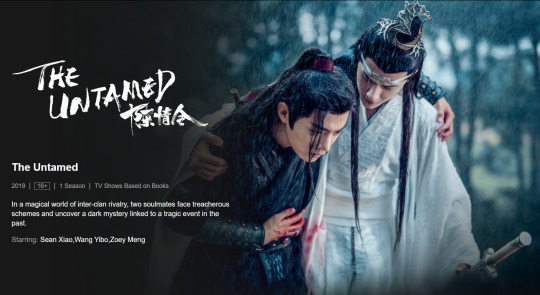
So, Yeah!!!! The Tagline itself touts them as Soul Mates...
This is my Head Canon about the Adult version of SNS... And the Actors are really handsome and talented enough to portray our Naruto and Sasuke in a Soulful Manner with such Tenderness.
After watching this series, even if you have a shred of doubt that Naruto and Sasuke may be Brothers.... it will all fly off to the trash Can because, the show clearly distinguished how Brothers would Act around each other and how Soulmates act in a subtly Romantic Way. I wish those Antis watch this series and understand the meaning of Soulmates & SNS... That’s only my wishful thinking...
[[I am not saying one ship is better than the other ship.... All I am saying is One Couple resembles the Other and I love them in my own way, equally]]
The Main Couple in The Untamed are Officially Gay (in Novel) and Soulmates (in The Live Action Series). If they are Gay and Soulmates, then so is SNS.
86 notes
·
View notes
Note
It really bothers me that tumblr will shit on Christianity all day long but all other religions, especially Judism and Islam, are off limits. I'm from the middle east and literally no-one will listen to me when I try to tell them Islam isn't cute or kind. *sigh* I know the West is becoming less religious in general and that's encouraging, but I don't see many signs that they're learning more about the reality of Islam, let alone dealing with it. :( Anyway, thank you for running this blog.
It's a really weird phenomenon.
Did you ever watch the American talk show "The Late Show with David Letterman"? (Go with me here, I promise I'll make a point.) In particular, the opening. As the opening titles began, the announcer would say: "from New York, the greatest city in the world, it's The Late Show with David Letterman!" This is what American patriotism often looked like, sometimes acting like America invented freedom, and occasionally even claiming it being due to Xianity. This obnoxiousness is called exceptionalism. Essentially, "we are uniquely the best."
Just as narcissism consists of grandiose narcissism and vulnerable narcissism, so too does exceptionalism live at two extremes. And it’s just as obnoxious.
Countries like the US, UK, Canada, Germany, France, Australia, New Zealand, etc that have some form of secular liberal foundation have progressed far enough to be aware of and ashamed of much of their own history. However, history is to be remembered and learned from so that it's not repeated, not lived in. But there's a manifestation of exceptionalism that basically ignores all the strides that have been made, the battles fought and won, and behave like nothing has changed in 50, 100 or even 400 years. That theirs is the worst country. The most racist, the most sexist, the most dangerous, the most etc, etc, etc. Even though it's not. Not even close.
This is actually the same thing, but in a self-flagellating way; call it "vulnerable exceptionalism." A form of superiority complex of self-declaring ones own inferiority. Sort of like Xianity itself. "I'm nothing without god," for example, attesting to how wretched and sinful they are. You often see this through their accusation that non-believers are "arrogant" for not debasing themselves at the feet of this imaginary deity. It's performative arrogant humility.
The truth is, they're probably unlikely to be the best person or the worst person in the world. They're probably exceedingly average, but there’s nothing exceptional about that. Attesting to one's broken nature wins the approval of the Xian flock, and in the same way, attesting to the supposed depravity of a first world country wins approval in certain ideological circles. But it's similarly a form of humble brag. A race to the bottom, rather than to the top.
Mix into this a little Postcolonial Theory (which I won't deep dive into), and you've got yourself a nice big serving of cultural relativism. Basically, the notion that secular, liberal western countries have no real claim to being "better" than a theocratic dictatorship, because look at what they did 1000 years ago.
Except that they are better. In every measurable metric of human wellbeing: lifespan, access to health, freedom, education, accountability of the government, and so on. But you're not supposed to say this, because it would be imposing western values onto a different culture. (But I did say it, and I'm not walking it back.)
In her book, "Unveiled," Yasmine Mohammed talks about how her country threw her back to her abusive fundamentalist Islamic family. Because hanging her upside down and beating the soles of her feet for not memorizing and reciting the quran is just the way the culture works. This happened in Canada, by the way, in the name of "cultural sensitivity." As she points out, and rightfully remains angry about, this would never have happened to a blonde, white girl in a Xian household.
This relativism encourages people who live in free, liberal, secular countries, whose rights and responsibilities, their government's obligations and limitations, are enshrined in their constitutions and laws, to see themselves as sharing a common fate with those in closed, totalitarian, theistic countries, such as those under Islamic rule. it's supposedly cultural humility to think that maybe Sharia is just as valid a social approach as French secularism, for example.
So you end up with the navel-gazing of people living in free, democratic, secular societies preoccupied with imagining air conditioning, hiking, knitting, cycling or other trivialities are somehow racist or sexist, because these are just as important as whether women are arrested for removing their hijabs in Iran, or blasphemers sentenced to death in Pakistan, or Islam as a religion/political doctrine seeks to subjugate the entire world under it.
Except they're not. People in countries like Somalia, Syria, Pakistan, Iran and many others dream of either escaping to such free, western countries, or transforming their own into one of them, where secular, liberal values allow one the freedom to pursue one's own happiness.
They want to be able to tell their stories about what life is like in strongly Islamic countries - and to be heard. Because the plain truth of Islam needs to be spoken, or nothing will ever get better. This isn't even isolated to apostates either. Plenty of devout Muslims want to see islam undergo a Reformation similar to what Xianity went through hundreds of years ago, but silencing criticism to protect “religious sentiments” takes higher priority among the ideological elite.
https://www.huffpost.com/entry/muslim-woman-activist-to_b_11761630
https://warsclerotic.com/2016/09/02/muslim-reformist-to-sally-kohn-stop-working-against-us/
No, free western countries might not be perfect paradises, but even where they fall down, they have the social machinery to be able to identify, address and resolve those problems. The Civil Rights Movement, Gay Pride among others, have been successful because of this machinery, not in spite of it. Liberalism isn't just a set of ethics, it's a way of resolving conflicts, not dissimilar to the scientific method. where current ideas are replaced with better ideas by making a reasoned case for change, by appealing fairness and to those Liberal ethics. And critics of Islam just want to have the same privilege of access to the Liberal machinery.
You’ll also notice there's usually some low-key racism or "noble savage" fetishization at play by Islam's non-Muslim defenders. To regard criticism of Islam as "racist" is itself racist, and invent language to shield it from valid scrutiny, in the name of signalling how virtuous and “inclusive” one is - that’s sophistry and narcissism. This language has of course been adopted by Islamic zealots; they know the magic word that's supposed to make you feel fearful of being seen as a bigot (the same people have no fear of being called a “homophobe”). In effect, to hold up Muslim people as a human shield to protect Islam the idea.
And really, if you haven't been called an "Islamophobe" by a Defender of Islam - whether follower or mere apologist - within two posts of interaction, have you even been online lately?
I realize I've talked primarily about Islam here, mostly because I think it's most deserved, but also that I don't think Judaism is that "off limits." For reasons of Intersectionality - "white passing", which is deeply ironic considering Hitler's Aryan objectives; success in America; and the bizarre binary mathematics of Intersectionality - categorizing Jews as an "oppressor" class. There's a more thorough dive into that here. What this Critical Theory/Intersectionality mindset has done is embolden more antisemitism of late - and particularly in the current Middle East conflict - just as it has anti-Asian hate.
Which is not to say that you shouldn’t criticize Judaism, since you absolutely should, but I don’t think it’s as untouchable.
In closing, you may also be interested in the views of Sarah Haider, who founded Ex-Muslims of North America and has been frustrated by the same phenomenon. There are several interviews I can recommend: here, here, here, here and here. An excerpt from one:
“It feels like a betrayal,” she replies. “I’m still shocked and appalled by it. It’s difficult to move on. The betrayal of the left has really hurt us, because in principle these people should be on our side, standing shoulder-to-shoulder with us in our efforts to reform Islam and bring human and women’s rights to Islamic countries. But they’re barring the gate, telling us we’re ‘Islamophobic’ or spurring hatred toward Muslims or contributing to a hostile atmosphere for them. They even say we’re contributing to Western imperialism. This is nonsense and is appalling to us.”
#ask#criticism of islam#islam#criticism of religion#religion#islamophobia#religion is a mental illness#intersectionality#exceptionalism#long post
106 notes
·
View notes
Text
@lavstar i was so incredibly stupid and i deleted your ask while i was drafting it… i swear i didn’t forget to do it 😭 anyway i’ve FINALLY finished it so let’s jump into the compilation of the most planes i have ever brainrot ❤️ because no ❤️ you cannot expect me to pick one ❤️ it is impossible ❤️

two airbus A320s taking off from parallel runways, five nautical miles apart ‘cause they’re not gay!
btw i genuinely do not care about military aircraft (never have, prob never will) so these are all to do with civil aviation. also huge disclaimer i did all the commentary off the top of my head (i did have to wikipedia some of the stats im not martin fucking crieff) so if i mess up a term or something that’s on me
of course no post about my favorite planes cannot leave out the OG. my first love, the most plane i have ever ridden; the one, the only, the increasingly irrelevant due to industry shifts, the beloved Airbus A380.


(L) just look at this big beautiful girl! + (R) a view of i believe scotland? as approached from the north
i don’t know why i love this plane so much, because lots of other people certainly don’t for a lot of reasons. her size makes her the main character out of necessity at every airport she comes across, and she’s an inconvenience for air traffic controllers for that reason. her origin story is [twitter stan account voice] a bit problematic. given changes in industry trends, she is also quickly becoming irrelevant. airbus my beloved please just admit that the four engines thing was nostalgia and go. she’s a marvel of engineering sure, but when all is said and done…the B747 came, she served cunt, and then she got phased out. the A380 was made with the intention of doing the same…unfortunately, she didn’t really complete the second step.
wait holy shit. i know why i love this plane so much. it’s because this plane…is me ❤️
—
and now for thee og in terms of famous big-ass planes that everyone loves: the B747. everyone loves the 747. even if they say they’re not into planes, they are. for me, not gonna lie: a very big reason for why i love the Queen of the Skies so much is mark vanhoenacker’s book, skyfaring. he flew the 747 for bri’ish airways (when they still had them) and loved that plane so much and man who am i to blame him.


(L) i think i teared up when i saw her through the big windows for the first time bc i was like oh my god. i am going to be on her. this icon of aviation, the arguable symbol of commercial aviation. so much history, so much significance… + (R) the past, the present, and the future of british airways in one image 🥺
i was on a 747 twice in my life. once on a cathay pacific flight to the philippines, and on my last flight abroad, on a british airways flight to heathrow. little did i know i was flying one of the last of their 747 flights—they phased them out completely the following year, a bit earlier than anticipated due to the pandemic.
as enzo ferrari once probably said, “ask a child to draw a plane, and certainly he will put a hump and four engines on it.” in terms of sheer iconic power and energy, the Queen (and she is the only earthly being to whom I shall ever refer as such) would far and away be the top on anyone’s list, save for the fact that i don’t have a top to this list and i have other planes to get to dear god this is getting long do you know what you’ve got yourself into!! the Queen really said “flight belongs to the people now” and the airlines just had to shut up and listen!! she is truly the main character!!!

genuinely don’t remember what river this is except that it’s in the UK… 🙈
i feel like everything else i say about her is just going to be a pale imitation of how evocative skyfaring was, so honestly i really recommend the book it’s so good and it’s one of my favorites. my copy is sort of falling apart now bc i kept bringing it around to places 😭 anyway, the number of airlines using her for passengers is decreasing, but you know who still use converted versions of her as well as purpose-built models? cargo airlines! anyway, ups and their brown planes my beloved 🤎
—
this slot was going to go to the B767 and 757, and i was going to rhapsodize about how aesthetically the 767 looks like a nicer plane to me because of Chonk, but the 757 is really endearing because it’s a narrowbody jet and it’s got landing gear that is long in a useful but unusual-looking way, which in essence what i’m trying to say is that if the 757 were a person, it would be esteban ocon.
so i was getting ready to write all of this down in much more words than i needed, but i remembered suddenly the very reason i was making this post in the first place. and that, my friends, is the B777.

honestly you don’t fully understand how big the 777 is until you see it in person. because we are all acclimated to think of like the 747 when we think of ‘big plane.’ but the 777 is massive. even i forgot about it when i wrote That Fanfic.
the 777 and 787 are the future of long-haul commercial aviation (and i say this as an A380 stannie). widebody jets with 2 big-ass engines are most likely what we’re going to see in the sky going forward when it comes to long-distance travel, and the pandemic pretty much confirmed that.
that aside, i love the 777. so much that i wrote a whole fanfic around one making an emergency landing ❤️ i really pretended ETOPS (the thing where a plane can fly for a long time on one engine) did not exist for six chapters and an alternate ending and i think that’s just very quirky of me aha 🤪
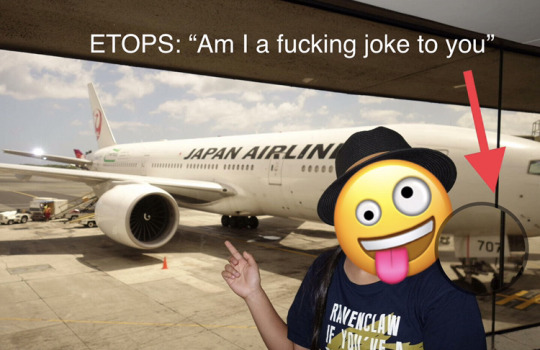
dear god do not mind my hat i literally bought it because of fred fucking thursday of endeavour… what the FUCK was teenage me on 😭
the 777 was supposed to be a trijet (one with three engines, two under each wing and one built into the vertical stabilizer) but as the mcdonnell douglas and lockheed martin trijets (cba to look up the numbers) were not projected to continue to be successful, they got rid of the trijet 777 idea and instead made it have two engines. another thing i think is neat is that all the examples of the 777 that you will see in the wild right now don’t have winglets bc the wings themselves are so long and raked back that they’re not necessary. which would be a weird thing for me in particular to find neat, because if you know me well you know i have a thing for winglets. (the 2022 f1 car’s front wing my BELOVED WAKSKDKSJSJ!!!!!) i also think the way the wingtip lights are incorporated into the wings are so neat. the upgraded version they’re trying to make now, the 777X, will have foldy wingtips so you can DIY your own winglets and i think that’s hilarious (and also cool).
—
genuinely i think i’m the only plane person that likes this last aircraft: the Embraer ERJ-175. i like her for purely nostalgic reasons. she reminds me of how i returned to my roots and decided to pursue engineering.
so okay this is going to have nothing to do with the plane, but i was lucky enough to be given a visit to the flightdeck after landing back home from a weekend trip. i was so excited to be allowed to sit in the first officer’s seat, and got to poke around the flightdeck for like ten minutes. which was cool, but all this was with the sinking realization that even operating a regional jet might be too physically demanding (read: unsafe) for someone of my… [exhales knowing EXACTLY what i’m about to walk into] height.

that is one fully glass cockpit. also those yokes are specific to embraer, boeing’s look more like f1 steering wheels with stuff cut out of them i think, and airbus’s are operated by side stick. it’s almost funny especially when watching flightdeck videos of the a380 cause it’s like… you’re doing All That *gestures vaguely at plane* with THAT *gestures at thing that looks like a chicken drumstick with semiconductors implanted in it*
so that was piloting as a career done with for me (much to my family’s relief.) and then i thought “hm i don’t have to be flying planes all the time to be working around them…why don’t i work on developing them instead?” and i was passively interested in matsci already, so that’s how and when i decided to pursue engineering, with hopes of working for airbus or boeing and in civil aviation.
we’ll see how that pans out, i say as i side-eye the exponential growth of my interest in motorsport.
thanks for the ask! i’m so sorry i was stupid and deleted it but i hope you like this very long, drawn out, and frankly deranged response 💚
#em speaks#lavstar#this is half me showing off my plane pictures half deranged rant i hope you enjoy
24 notes
·
View notes
Note
do it bee
alright.
there’s a few things i kept seeing confusion about, so i’ll try to clear it up the best i can with my amateur enthusiast knowledge.
disclaimer: all of this could be completely wrong. this is just what i’ve learned from working as a bookseller in the past and taking a few classes on publishing and just generally doing a lot of personal research into it both as a reader and with interest in joining the industry. i do not know dan’s individual situation, nor am an expert by any means. i am also coming at this as a canadian, so the innerworkings of uk/us publishing are just from what ive learned here.
you will get through this book:
bee’s possibly incorrect far too long guide to the publishing industry and how international editions and signed copies might work for daniel howell’s new book ‘you will get through this night’ available for preorder now
follow @daysuntilthisnight for a countdown #shamelessselfpromo
1) the uk vs us edition
the uk cover is the one without dan’s face on it. the us cover is the one with dan’s face on it. its not uncommon to have multiple covers and putting someones face on the cover is a very american publisher thing to do, personally i really like both. the cover you get is dependent on where you/your country order the book from.
if you ordered from danandphilshop or shop.danielhowell, you will be getting the uk cover, as it is a uk business. if you ordered from the us store right when the book was announced and before the signed copies sold out, it will probably be the uk cover (more on that in the bit about signed books). after that, i’m not sure because i do not know how irlmerch’s distribution works.
one thing to note is all books have an ISBN number which is like a universal barcode for the book at all stores and it comes from the publisher. the beginning of the isbn dictates the publisher/language/product type/etc and the end identifies the particular book. the uk edition and the us edition have different isbn numbers, as will the ebook, audiobook, etc. this is a good way to figure out which edition you are buying from your local bookstore, and you can cross reference with the isbn in uk or us stores. its usually listed at the bottom of the product page online.
if you live in a country besides the us or the uk, it depends whether the book is being distributed or published in your country. distribution is often more cost effective, and is usually the way it works. as far as i know, dan’s book is being distributed (not published) to the countries on this list with the exception of the us where it is being published (not distributed). if a book is being published in a country, it will have a different isbn and sometimes a different cover. if a book is being distributed it will have the same isbn and cover as the country it is distributed from (usually the closest publishing hub, so london or new york in this case).
to know what edition is in your country, you can compare the isbn numbers and/or the covers. you can also take a look at your other books to see whats normal in your country to get sort of an idea. im assuming europe will get the uk edition but im not sure about other countries.
here in canada for example, our books are usually distributed from the US meaning you will be getting the us cover if you order the book from a canadian store. i ordered from irlmerch when dan’s book was announced though, so i think im getting the uk edition.
1.5) covers and book design
most of the time, especially with new authors, the author has very little say in the final decisions re: book cover and book design. they usually get input, and the publisher gets final say. book design is also a very different thing then general graphic design and professionals genuinely go to school for this. thats not to say there arent bad book designs or that regular people can’t do it too, it’s just something to keep in mind.
2) signed books vs signed editions
there are a few different ways that signed books can work. primarily, there are signed editions and signed books. both are physically signed by the author, the difference is when in the process these books are signed.
signed books is the ‘old-fashioned’ way, where the author will sit at a table and sign copies of their book. the author usually signs on the title page and for a long time, this was the only way to do it. they have already been printed by the publisher so they will have the same isbn as unsigned books. signed books are usually more limited, often they can be personalized, and if you have ever gone to a proper book signing where the author signed the book in front of you, you have a signed book. signed books are also sometimes made available at the authors local bookstore because they are able to sign them in person. as far as i know, the books that were ordered from danandphilshop or shop.danielhowell during the initial signed run will be signed books. i also believe there are/were limited signed books from uk retailers, i think those are/were signed books (not editions) where the isbn matches the normal first edition of the book.
signed editions are a fairly new thing, and have made signed books so much more accessible which is awesome! signed editions have a different isbn then their normal edition and signed book counterparts. they are technically two different books and are listed as a separate book in stores. that is because signed editions have one (1) extra page. this allows the author to be sent boxes of pages, not books, to sign BEFORE the books are bound. the pages are then sent back to the publisher to be included in the final printed copy of the book.
signed editions help authors to sign even more copies which allows for things like signing hundreds of thousands of copies of a book in some cases. if you are familiar with john green’s books (and hank’s too), he is a large part of the reason signed editions increased in popularity. for example, his book turtles all the way down had a signed edition and a normal edition, they were the same price but the signed edition included the one more page that john had signed. this also allows authors to do fully signed first edition runs, such as john’s new book the anthropocene reviewed (which comes out the same day as dan’s book lol), where every single copy of the first edition is signed (so there is no such thing as an unsigned american first edition, this is becoming more popular for some authors to do especially if the first edition print is not very a large quantity).
if you saw dan’s ig story from today (which was almost definitely a delayed post lmao), he was signing the signed edition papers that will be bound in the signed edition copies of the book in the us. as far as i know, it is only the us publisher that has this option. as you can see on the us store books-a-million, there is a signed edition and a normal edition. they are listed seperately and there are different isbns. the signed edition will be bound with the one extra page that dan has signed.
both types of signed books have been actually signed by dan and are so cool to have if that’s something you want and are able to get. if not, you’re not missing much.
3) book piracy and pricing
i’m not here to tell you what to do, so i won’t. i know being able to buy books is a privilege and dan is a millionaire. full stop. he doesn’t need the money and you probably do.
books are expensive. the difference between cost and price of a book can vary drastically. does your calc textbook actually cost the publisher $300? probably not, but it does cost more per copy to print less copies of something (like a textbook) then it does to print millions of copies of a nyt bestseller. does a $24 book cost that much to develop/print/distribute? maybe.
but most of that money goes to the publisher. the fact of the matter is authors get very little from the actual sale of the book (usually only a couple dollars), which okay, not exactly convincing you against piracy but hear me out. the actual number of sales a book has lets a publisher know how successful a book is, which helps to decide how many more prints/editions are made and often dictates future opportunities for authors.
a series of books that i love is very popular on tumblr, but there was a serious problem a few years ago where copies of the book were being pirated so much, sales were down so drastically, that the publisher almost didn't continue to publish the series. in the case of smaller authors or your favourite ongoing series, buying your copy of the book could be the difference between the existence of the next book or not. in dan’s case, i don’t know what his future plans are, idk if he plans to write more in the future, but i do know that publishers look at previous sales to decide if they are going to publish a book in the future.
ebooks are usually cheaper and more accessible if money is an issue. used books, while not helping with sales, are also a great option if you’re willing to wait and look around. you can often request your local library buy a book and read it that way, or they might even already have it. there probably even audiobooks and ebooks at your local library. stores like am*zon are usually cheaper as well. online stores of large chains like b&n and indigo will often have the books cheaper to match amazon. however if you can, support your local bookstore.
of course if the author is a horrible person do whatever tf you want. also fuck the textbook industry.
tldr: dan worked really hard on his book with professionals to make it the best it could possibly be. i think it looks beautiful, and it will help a lot of people. the publishing industry is a mess but really cool. check the isbn of the copy you ordered if you want clarification or you can just wait for the surprise.
#this is nearly 2k words#i was supposed to work today xsfhkdf#but this was fun!#also if anyone has any more info or anything id love to be (nicely) informed#and any other qs i can attempt to answer#ask#anon
55 notes
·
View notes
Text
Heyo! I got my favorites all sorted out! Time to share!
I should’ve done this days ago, but I’ve been.....busy. XD I’m currently writing another fic, and it’s turned out to be....quite the undertaking....So, uh, that’s been taking up all my writing energy this past week or so....A-and it still is, but I was able to pull myself away from it today to make this. I’ve still been listening to the playlist regularly, and have gotten myself familiar with the songs, so....yeah!
1. Finland - Like I said before, I pinned this as my favorite after only three days. I LOVE this song. While every other entry is something I can happily wait for while I listen on shuffle, and be happy when it pops up, THIS SONG is the exception. This is the only one of the bunch that I’ve listened to on repeat for an hour. When was the last time I love a Eurovision entry so much that I couldn’t stand waiting for it on shuffle? Do I need so say more here!? XD
2. Austria - Just pure fun! Of the “turn your brain off and enjoy the music” songs, this is as good as it gets! Also one of the catchiest songs of the year!
3. Bulgaria - While I don’t like it as much as Finland’s song, this is still a really great rock song with good lyrics. It just doesn’t have AS much of a punch as the former. But still, two rock songs I flipping love in one year!? Man, “Zitti E Buoni” was one of the best things to happen to this contest....
4. Estonia - After Finland’s entry, this was the first song of the bunch that I learned the lyrics to. Cuz, well.....I may not be a boy, but I wanted to sing my heart out to this! It’s just so uplifting and freeing, and it sounds soooooo good!
5. Montenegro - This is this year’s winner of the “I love this song, but I can’t explain why” award. I have a hard time talking about this one cuz I....I can’t explain why it works for me, it just....does! The lyrics, the melody, everything!
6. Romania - This song is just SO flipping cool! That beat is downright mesmerizing...The instrumentals in particular make this song.....I hope Romania don’t get snubbed outta the final again, cuz this deserves attention.
7. Malta - I put this last cuz, compared to the other six, it’s comparatively generic, but I still love this song to death. It’s probably gonna be my big underdog favorite of the year. I don’t think many people are gonna pay attention to this, but it hits me so hard every time I hear it. It’s like....a more positive outlook on Australia’s entry, if that makes sense? And the choir-
And now my borderline favorites! I have four:
8. France - Juuuuuust BARELY didn’t make my favorites, but when one (or more) of my favorites don’t qualify, this is gonna become one! Auto-qualifier hype! Nothing to really say other than....one of the BEST beats of the year, and I love synth music!
9. Poland - Another one that I can’t really explain....It just....grew on me SO rapidly. The vocals are so flipping good, and if I had to describe it all in one word, it’d be “magical”. Not every day I describe a song with that word....
10. Ukraine - Catchiest, most unkillable earworm of the year. That is all.
11. Cyprus - S-so.....when you’re currently in love, songs like this just....sound amazing. Maybe it’s bias, but eh, it’s my list.
As always, the rest of the songs haven’t been ordered yet, but I will say that Israel and the Czech Republic just barely missed being borderline favorites (although it’s partly bias with the former), Norway still makes me unironically laugh in a way I can’t help but love, and oddly enough, the UK gets a shoutout cuz I actually caught myself singing along to their song earlier, and I....oddly knew most of the lyrics already without attempting to learn them? It was already one of the biggest growers to me, but yeah, I had no idea to what extent until that. XD And Australia gave us an example of a song that speaks to me so hard that I can’t help but respect the heck out of it, but in way that makes it hard to listen to sometimes rather than the opposite. It does have one of the best voices of the year tho.
(And again, Latvia’s entry has no right to sound as good as it does.)
Like I said before....after learning their lyrics, Italy’s no longer my least-favorite. That’s now Croatia. Their entry sounds pretty, but there’s one lyric that I absolutely hate and it kinda ruins my enjoyment. I also think I like Italy more than Germany too. I like some of the lyrics to Germany’s entry, but musically, it’s boring.
I’ll check the betting odds in a few days, give my thoughts on those, and then attempt to do my yearly opinions post, but it might be a bit tighter this year, cuz I’m busy writing something else big and time-consuming.....We’ll see, though.....
3 notes
·
View notes
Note
Please say more about aspirated medial stops, I was talking with my brother in law the other day about how we (Californians) don't say t's in the middle of words and I'm really curious about why that is and if this is a universal thing in all accents of English now
Disclaimer: I do have a Bachelor's in linguistics, but I got it more than a decade ago so it is possible that some of the information in this post will be misremembered or out of date.
tl;dr
Knowing how to pronounce t in different locations in different dialects is a nightmare. Old-fashioned British Received Pronunciation pronounced t in the middle of words, but there's a UK language drift called T-glottalization in which ts except at the start of words are often being replaced with glottal stops? It's really obvious in lower-status dialects but it's been creeping into RP as well.
American English usually does a weird muscle flex called a "flap" or a "tap" that's something like a really short d, or a single roll of a rolled r. I think there are some UK dialects that use this tap as well.
I belieeeeeve that Indian English usually pronounces word-medial ts, but I haven't run an actual analysis on the applicable coworkers' speech because that'd be kind of creepy?
No idea about Australia or New Zealand.
As far as I know, there's no special reason why these particular drifts are happening. Linguistic drift and accent shifts are just something that happens with living languages. If anything, we have immensely slowed the natural process of language change through the invention and widespread teaching of standardized writing.
Glossary
Sorry, I tried doing this without a glossary but I kept having to do weird info cul-de-sacs to explain myself. I've ordered them according to approximately when they'll come up?
lol I failed so hard at this, about halfway through the post I started using words without putting them in the glossary first and man idk I've been working on this post for 4 hours now and I don't want to go back through and put definitions for some of this shit, sorry
Phoneme - A single language sound, as it is stored in your brain. Represented with slashes around it, e.g. /t/.
Phone - A language sound as it actually comes out of your mouth. Represented with square brackets around it, e.g. [t].
Phonology - The study of speech sounds, from internal representation to external expression, but not including the study of how they are physically created in the mouth (that's phonetics). Not to be confused with phrenology, the racist pseudoscience of head shape.
Word - Can have a few different meanings in a linguistic context. In this post, will usually refer to either a lexeme or a phonological word. You should be able to tell from the context.
Phonological Word - What you probably think of when you think of a "word." A unit of speech that you could naturally pause on either side of, but could not naturally pause inside.
Lexeme/Semantic Word - A single phonological word and its attached meaning; or, phrase of multiple phonological words, which holds a meaning which is different than the sum of its parts. For example, "Carry the bucket" is not a single lexeme; but "Kick the bucket" is.
Voiced/Voiceless - A sound is voiced if you use your vocal cords to make it, and voiceless if you don't.
Stop - Also called a plosive. A stop is a kind of consonant you make by stopping all air flow. The stops English uses are p, b, t, d, k, g, and the glottal stop.
Aspiration - A puff of air following a sound, usually a voiceless stop. In phonetic notation, it is indicated by a superscript h following the consonant, like [pʰ].
IPA - International Phonetic Alphabet. A standard set of symbols based on the Roman alphabet and used to refer to roughly the same sounds regardless of language.
Glottal stop - A stop which is performed not by your tongue, as in most stops, but by your vocal cords. Think of the word "Uh-oh" - the way you completely stop airflow after the "Uh" instead of just letting it flow into the "oh." That's a glottal stop.
Praat - An audio analysis program tailored specifically for viewing waveforms of speech sounds.
INFODUMP TIME
So the thing about saying words is that the ideas of sounds that you have in your head ("phonemes") don't translate one-to-one to the sounds that come out of your mouth ("phones"); and the ways that these sounds get modified vary between different dialects.
Please keep in mind that when you try to speak slowly or clearly, the sounds that you make change. Linguists are primarily interested in natural speech patterns, not what we do when we're trying to enunciate.
Tater-Tot
Let's take the lexeme tater-tot, because it's the first word I can think of that has all 3 of the major weird things that /t/ does that vary by dialect.
Let's start with the word-initial t. Phonologically there are actually two word-initial t's in tater-tot, the one at the beginning of 'tater,' and the one at the beginning of 'tot.' This is because "tater-tot" is two phonological words despite being one semantic word.
In American and British English, we aspirate our word-initial voiceless stops if they're immediately followed by a vowel, which means we pronounce /p/, /t/, and /k/ as [pʰ], [tʰ] and [kʰ] respectively if they're the first sound in a word (and immediately followed by a vowel). This means we add in a little puff of air following the consonant if it's the first sound in the word. In Indian English, they don't do this - a word-initial /t/ is pronounced [t], without the extra puff of air. To American & British English speakers it can almost sound like they're saying [d], because we're not used to hearing a word-initial /t/ without aspiration.
Next we've got a word-medial t, the second t of "tater." Here, Indian and British RP English speakers pronounce it as a plain [t], with no aspiration. American English speakers pronounce it as what's called a tap or a flap, which is sort of like a half-formed [d] but is actually more like a single roll of a rolled r - and so its IPA symbol is [ɾ]. And many less prestigious British dialects, including Cockney and I believe Scouse, replace it with a glottal stop, with IPA symbol [ʔ].
And our final t is the word-final t of tot. This is a tricky one to peel apart. English generally doesn't release word-final stops - that is, you put your tongue in the correct place to stop airflow to create the stop, but you never actually move your tongue out of the way to "release" the airflow you stopped. So the easy read on the word-final t's pronunciation is that it's [t̚], an unreleased t. However, in many dialects and situations /t/ is replaced with or co-articulated with a glottal stop - for example, after an [n] or an [m], /t/ is almost always pronounced as [ʔ] in English. But unreleased stops after an oral vowel are difficult to tell apart, and if the tongue is in t position while the glottis cuts off airflow - I genuinely don't know.
Tuck/Stuck
These are good for a comparison between an aspirated [tʰ] and an unaspirated [t]. In American English, tuck is [tʰʌk] and stuck is [stʌk].
Truck
American English does weird things with syllable-initial /tr/.
I want to introduce you to the "sh" symbol, ʃ. ʃ is a voiceless postalveolar fricative, which means it's created by air rushing through a narrow space when your tongue is behind the alveolar ridge. Incidentally, when you move your tongue from [t] position to [ɹ̠] position (ɹ̠ being the symbol for the version of non-rolled r that most English dialects use), it will naturally create the ʃ sound as it moves.
We have a special letter combination to the phonemic /tʃ/ in English. It's "ch". As in "change."
You almost certainly pronounce "truck" as [tʃɹ̠ʌk] "chruck" and just don't notice.
So what's going on with Martin?
So first off, Jonny is probably wrong about how the Archivist says "Martin." Complete deletion of the r in that position is standard in RP. I haven't fed The Magnus Archives into Praat or anything, so it's possible he's letting a hint of a rhotic accent bleed in to the Archivist's RP - but I really doubt it.
This isn't unusual! It's very common for people's internal concept of what sounds they mean to make, to get in the way of them accurately identifying what sounds they're actually making. No one thinks they've ever said "chruck" until you point it out to them.
I would probably transcribe the Archivist saying "Martin" as [mɑ:tɪn].
Jonny's attempt at saying "Martin" in an American accent was something more like [mɑ˞ɹ̠tʰɪn]. He did a good job of rhoticizing the vowel, but in his focus on the r completely messed up the second syllable.
I'd transcribe my own pronunciation of "Martin" as something like [mɑ˞ɹ̠ʔn]. It's been my observation that t-glottalization in American English is especially common when adjacent to nasals - and if there's one thing American English likes, it's syllabifying liquids in word-final syllables.
OK I've run out of steam now
This was fun. Sorry about the declining quality of explanation. Please feel free to ask more if you dare to reignite the flames of infodump
#infodump#linguistics#the letter t#phonology#english phonology#english dialects#dialects of english#ask button#ask boombutton#ask theboombutton#jonny sims
9 notes
·
View notes
Text
The Four Loves - Eros
Lewis very specifically distinguishes eros (romantic love, being ‘in love’) from sexual desire (which he calls Venus). (This is, by the way, very helpful for my understanding the concepts of asexuality and aromanticism and the distinctions between them.)
Lewis starts off the chapter with noting that he doesn’t think there’s anything wrong with people marrying without eros and in fact that’s been the nature of most marriages through history. (So we can conclud he’d be okay with ‘friends-with-benefits’ provided that it was committed, monogamous friends-with-benefits. In fact, he initially married Joy Davidman - in a civil ceremony, not a religious one - so she could retain her UK residency, when they were close friends but not yet in love, though given his convictions they probably didn’t sleep together at that time.) Nor is there anything inherently ‘right’ about eros, and it is certainly capable of leading to wrong and hurtful actions.
Lewis describes eros in this way (his entire discussion of the subject is from the male perspective):
Very often what comes first is simply a delighted pre-occupation with the Beloved - a general, unspecified pre-occupation with her in her totality. A man in this state really hasn’t leisure to think of sex. He is too busy thinking of a person. The fact that she is a woman is far less important than the fact that she is herself. He is full of desire, but the desire may not be sexually toned. If you asked him what he wanted, the true reply would often be, “To go on thinking of her.”...In some mysterious but quite indisputable fashion, the love desires the Beloved herself, not the pleasure she can give.
...The reader will notice that Eros thus womderfully transforms what is par excellence a Need-pleasure into the most Appreciative of all pleasures. It is the nature of a Need-pleasure to show us the object solely in relation to our need, even our momentary need [e.g., a glass of water when we are thirsty]. But in Eros, a Need, at its most intense, sees the object most intensely as a thing admirable in herself, important far beyond her relation to the lover’s need.
Without Eros sexual desire, like every other desire, is a fact about ourselves. Within Eros it is rather about the Beloved. It becomes almost a mode of perception, a mode of expression. It feels objective; sonething outside us, in the real world. That is why Eros, thoigh the king of pleasures, always (at his height) has the air of regarding pleasure as a by-product. Anyway, whose pleasure? For one of the first things Eros does is to obliterate the distinction between giving and receiving.
I’ve quoted the passage at length because I am trying to get a clearer understanding of the ideas here; it is less easily understood, to me, than the other forms (and not something I’ve personally experienced). But the last line draws me to something from George MacDonald’s writings that I’ve often applied to my understanding of romantic love and how it differs from others. Friendship, or philia, is the enjoyment of someone’s company because you share the same interests. Eros is the enjoyment of the Beloved’s interests because they are the Beloved’s. MacDonald expresses this in his short story “The Day Boy and the Night Girl”, about a boy who is raised to only ever see the day and never experience night or darkness, and a girl who is raised in darkness and never sees the day. They meet, they fall in love, and it concludes with:
Hardly had one [year of their marriage] passed, before Nycteris had come to love the day best, because it was the clothing and crown of Photogen...and Photogen had come to love the night best, because it was the mother and home of Nycteris.
In the story of Aldarion and Erendis in Unfinished Tales, their marriage falls apart because they don’t have this: each of them values their own pursuits, preferences, and desires more than they value being with the other (though I think Aldarion is far more to blame, as she makes many, many allowances for him, and he makes very few for her). Likewise with the Ents and Ent-wives, who both prefer being in the lands that they love over being together.
In contrast to that, Lewis says that the goal of eros is not happiness, but valuing togetherness over being happy:
Eros does not aim at happiness. To Eros all calculations are irrelevant. Even when it comes clear beyond all evasion that marriage with the Beloved cannot possibly lead to happiness - when it cannot even profess to offer any other life than that of tending an incurable invalid, of hopeless poverty, of exile, or of disgrace - Eros never hesitates to say, “Better this than parting. Better to be miserable with her than happy without her. Let our hearts break provided they break together.” If the voice within it does not say this, it is not the voice of Eros.
It is in this respect that Eros can give us a greater understanding of our relationship to God:
This love is really and truly like Love Himself. In it there is real nearness to God (by Resemblance [in its willingness to give up everything for the Beloved]). Eros, honoured so far as love of God and charity to our fellows will allow, may [also] become for us a means of Approach. His total committment is a paradigm or example, built into our natures, of the love we ought to exercise towards God and Man. It is as if Christ said to us through Eros, “Thus - just like this - with this prodigality - not counting the cost - you are to love me and the least of my brethren.”
...In one high bound [eros] has overleaped the massive wall of our selfhood; it has made appetite itself altruistic, tossed personal happiness aside as a triviality and planted the interests of another at the centre of our being. Spontaneously and without effort we have fulfilled the law (towards one person) by loving our neighbour as ourselves. It is an image, a foretaste, of what we must become to all if Love Himself rules in us without a rival. It is even (well used) a preparation for that.
Yet, as noted above, this is not to say that eros is intrinsically good. In fact, Lewis considers it one of the more perilous forms of love, precisely because it is so overpowering that it can lead lovers to think that everything they do for the cause of love is right or justifiable. If amor vincit omnia refers to eros, then Lewis disagrees with the assertion (and so do I). The rejection of it is one of the things I love about Jane Eyre, where in the scene after Jane finds out that Rochester has a living (and insane) wife, and Jan and Rochester are still as deeply in eros as they have ever been, she chooses to leave because staying and living as his mistress would be wrong, defying both his passions and her own. Lewis describes the destructiveness of unrestrained eros, “ready for every sacrifice except renunciation,” and with the particular danger that “temptations speak with the voice of duties” - to go against romantic love feels wrong even when it is right. This doesn’t just refer to love-affairs. We see it in Les Mis when Marius determines to detach Cosette from Valjean (whom he regards as a criminal and danger, and whose wealth he suspects is ill-gotten) for love of her, and Cosette is wrapped up in love for Marius enough to forget Valjean.
And despite the overwhelming demands that eros makes, it is “notoriously the most mortal of all our lives; the world rings with complaints of his fickleness.” People promise very sincerely to be in love forever, and the feeling fades shortly. Lewis notes that “Between the best possible lovers this condition is intermittent” - which is not the case for affection or for friendship. Between those intermittent times, a committment that goes beyond momentary feeling, along with affection, and (ideally) philia between partners must be able to sustain the relationship. (Lewis, probably thinking of his relationship with Joy, asks anyone who is fortunate enough to have true philia with their spouse, in addition to eros, and who had to choose between the two loves, which they would choose; I think the implication is clear that he would choose philia, which was the intial foundation of their relationship.) Which is to say that, if we mean eros (rather than nonsexual physical affection) when we say ‘romance’, almost all people are aromantic most of the time.
19 notes
·
View notes
Text
The more I see from Mark Fisher the more fruitless his writing seems in terms of actual implications for theoretical/practical future movement of any anti-capitalist politics...like for all his talk of the impotent paralyzed state of a left unable to escape or meaningfully able to learn from its past, beset by circular patterns of discourse and movement it's tied itself up in as a result of cultural fixations/conflicts and stifling insular academic and/or online intellectual developments that are often completely detached from the actual political sphere, unable to formulate an actionable political programme that can genuinely confront power, have no relevance to the social base of a potential anti-capitalist movement, etc, like for all the talk of that shit his own critiques of those things tend to essentialize them as inextricable, even inevitable features of capitalism itself and as a result cultural or intellectual trends that are not intrinsic to but symptomatic of a system based on this particular mode of production, and that develop as a result of the interplay between societal elements existing within and formed by that system in a given time and place, are posited instead as defining features of that system (for example the insistence that regurgitation of past cultural forms must be seen as inevitable features or tendencies of capitalism - and that that alleged fact has some fundamental explanatory power - rather than being seen as trends that have come to prominence, and cyclically have become prominent before as well, due to the ebbs and flows of accumulation of intellectual property & consolidation of productive/investment capital etc and that at times have given way to or existed alongside dominant cultural/artistic movements outside of that retrofetishistic lane. Which like even when that was the case capitalism was still bad...like the problem is not encapsulated by the culture's perceived failure to find the next jungle music, nor would it be solved or meaningfully altered were the next jungle music to be found). And in that process you're bestowing an undue sense of significance upon and giving a completely misplaced centrality to things that you're purporting to be criticizing on the grounds that they distract from and are unproductive when it comes to dealing with the pressing core issues by which we're actually faced, while completely failing to incorporate the breadth of actual political & economic shifts, movements, conflicts, etc both against and in favor of the expansion of capital within your analysis in the same way that the individuals/organizations/institutions that you started out critiquing are guilty of. And that related failure to genuinely consider political reality as it exists outside of certain insular left spaces & discourses as well as the left spaces & discourses being used as the basis for the critique being advanced largely neglects anything that might be going on outside of metropolitan centers within advanced western states (and even then it seems mostly confined to the anglosphere) that might complicate or even outright contradict the narratives being advanced, which idk may also contribute to the tendency to grossly generalize and even essentialize specific aspects of society or culture that have taken shape in the first-world as being endemic to capitalism itself as it exists and must exist everywhere at all times...and even if that's being done based on the view one sometimes sees that as capitalism advances then the societal condition of the global south will come to resemble that of the current north then it's still bullshit because while of course that does and will still continue to happen in some respects, there's no broad convergence of that sort in sight at all and given increased pauperization already in motion as a result of ongoing economic trends and mass migrations as a result of accelerating climate change the future of LA or Berlin might look more like the present in Rio de Janeiro or Mumbai than vice versa...idk like there are genuinely interesting discussions of music and evocative (though by no means novel on the level or either tone or content) descriptions of a certain kind of prevalent malaise and ennui peppered throughout Fisher's work but his analyses of the way those things reflect and/or are produced by capitalism itself either fall off the mark or, again, aren't advancing any ideas that haven't long been circulating either in the marxist critical tradition or in any others that have in differing ways been in some form of dialogue with or have to some degree been influenced by it (even those that either explicitly/self-consciously or not find themselves in opposition to marxism, poststructuralism being probably the most obvious/notorious example) right down to the concept of capitalist realism itself, which as elaborated by Fisher offers nothing that isn't present in the diverse and even divergent analyses & conceptual frameworks surrounding ideology, consciousness, hegemony, the ~real~, etc that were already there in the work of everyone from Marx himself to Lukacs to Gramsci to Althusser, Baudrillard, Jameson, Eagleton or numerous other notable figures even just within the western intellectual realm. Like the only distinguishing feature of Fisher's capitalist realism is his contention that in the aftermath of the USSR's collapse, not only has the social reality generated by capital successfully naturalized itself in various pervasive ways as it has been doing for the past five hundred years, but now there's been a crucial turn in that since 1991 there's been an additionally ingrained negation of our ability to conceive of or pursue alternatives to neoliberal capitalism on a collective level, which allegedly wasn't there before...which like I'm sorry but that's a ridiculous fucking claim to make especially in light of the fact that shortly before his death Fisher said that the movements behind/supporting the rise of Jeremy Corbyn to labour party leadership & the 2016 Bernie Sanders campaign represented breaks in and the beginning of the end of the era of capitalist realism, which like. If that's the standard then how does the latin american pink tide of the late 90s-late 00s, which involved much larger popular movements that were much more firmly rooted in and directed by the working classes and peasantry and that pursued much more radical goals and even in the face of counter-revolutionary forces that have been ascendant in recent years still succeeded in attaining significant tangible gains for themselves, especially when compared to the negligible results that revived new deal democratic or midcentury labour agendas have had so far in the US & UK, like how did that shit not contradict capitalist realism well beforehand...or the fact that in Cuba the first post-Soviet decade entailed a renewal of genuine socialist energy & societal transformation of a kind not seen since the first 10-15 years immediately following the revolution, or on the other end of things, the clerical authoritarianism that existed in iran already at the time, or the terrifying rate at which the genuinely fascist RSS consolidated popular support and came to have an increasing hold over the various institutions governing Indian society, especially since the early 90s, until at this point there's no significant challenge to their power within the second most populous country in the world...like all those things seem to be much greater refutations from so-called capitalist realism to the point that the concept seems to have no meaning or utility at all...like whether intentionally or not, Fisher's ~acid communism~ basically leads to the same endpoint, perhaps with different aesthetic trappings, as FALC bullshit, where residents of the first world are freed of the labor and alienation of the past by a super expanded version of the welfare states created by postwar european social democracies and can both go to raves and consume as often as we want. The problem wasn't the violent abstraction of commodified life, the value form, whatever it was that we couldn't pursue and indulge in the thrills and pleasures that per my mans Lyotard & Nick Land are undeniably present in capitalist consumer society except now we can, thanks to those beefed up fully automated welfare states, those indulgences are no longer simultaneously a source of malaise and depression as they previously were when the free market barred the masses from partaking of them with the freedom and reckless abandon that are necessary in order to give us that truly liberated libidinal fulfillment. What the effects of the magically automated extraction of the natural resources necessary to maintain that steady flow of goods and resources to the fully automated luxury acid communists might be on the environment, how that might impact the people that live in the places where extractive industries tend to be based, how they might fit into this acid FALC utopia, whether they'd be forced into ever more menial forms or labor building or providing upkeep for the robots that replaced their former fellow proletarians in the first world, whether their labor might itself be the supposedly 'automated' part of fully automated luxury communism, whether they might legally be recategorized as robots so as to prevent that seeming contradiction from shaking things up, no need to trouble ourselves with that
49 notes
·
View notes
Text
New tag game: Post pictures of your first ever (fictional/celeb) crush to the latest one and tag five others to continue the game
Thanks to @minmoyu for tagging me and ooof, are you sure you’re ready for this?!! :D I have been around/in fandom for a loooooong time and at first I thought, okay, no way I can list all my crushes, there have been SO many and we’ll be here all day but then as I started compiling a list I found I was having fun reminiscing and decided, what the heck, yeah, let’s do em all... or at least all I can remember! :D
There have absolutely for sure been other more minor crushes and passing fancies along the way, but these are the big ones that I remember (and that, in more recent years, I can track by going through my posted fanfics on AO3 and even *shudder* FFNET and seeing which shows I was into enough to want to write fic about the characters).
[Quick note: with rare exceptions, for actors I am listing them by the character they played rather than just the actor. Whilst there are actors that I like in multiple roles (and conversely, characters who on paper I would normally be into but are played by actors who do nothing for me, and hence the character generally does nothing for me either), for the most part it is the character I really have the crush on.]
I’m going to put this under a readmore cos it has gotten ridiculously long:
So... without further ado:
1. MORTEN HARKET from a-ha - OKay so, dating myself badly here but... I had the *biggest* crush on Morten Harket when I was a teenager. Pretty much the entirety of my side of the bedroom I shared with my sister was covered in posters of a-ha, and Morten in particular. I even had a heart-shaped Morten Harket pillow! :D I loved a-ha’s music (still do!) and I wanted to go see them in concert when I was 14 but my parents wouldn’t let me (*sob*). I did finally get to see them in concert in the early 2000s and they were BRILLIANT live (and Morten was still very very pretty)!
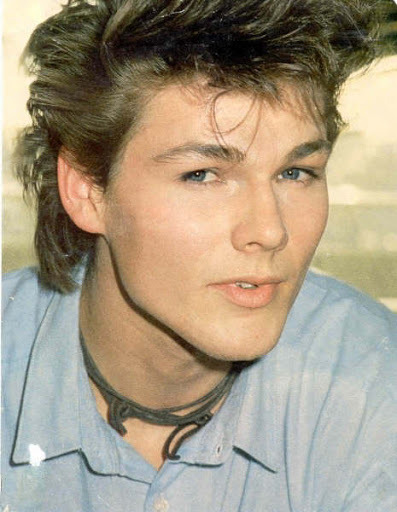
2. RICHARD DEAN ANDERSON as MACGYVER - MacGyver is the first tv character I remember being really into and having a crush on, to the extent that I would record episodes of the show off the tv (onto VHS tape - yes, I am *that* old!) so that I could rewatch them (especially the ones where he got hurt - yeah, I was a whumper even then! :D)
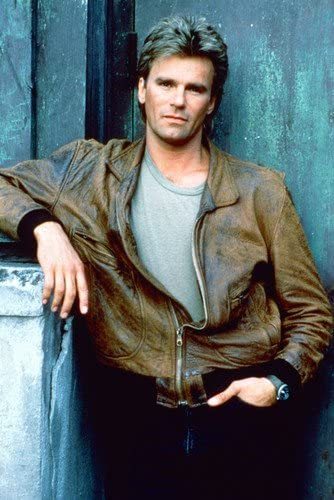
3. KEIFER SUTHERLAND - One of my rare exceptions. I think I first saw him in Lost Boys (and loved him in that film) but it was his role as Doc Scurlock in Young Guns that really made me fall for both the character and him. I definitely remember seeking out any and all films he was in and buying any magazine he was interviewed in (and knowing far more facts about him than was probably healthy! :D) and even drawing a fanart portrait of him. :)
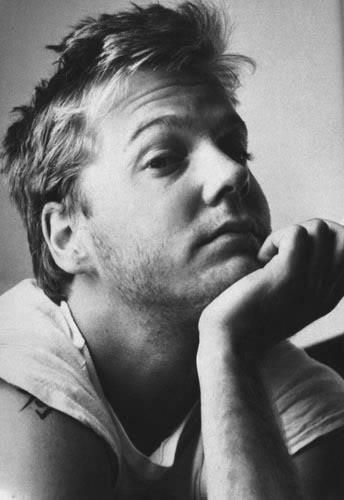
4. KYLE MACLACHLAN as SPECIAL AGENT DALE COOPER - I remember hearing about Twin Peaks before it started airing in the UK and it sounded so different and interesting... I watched it from the very first episode and very quickly developed a crush on Coop.
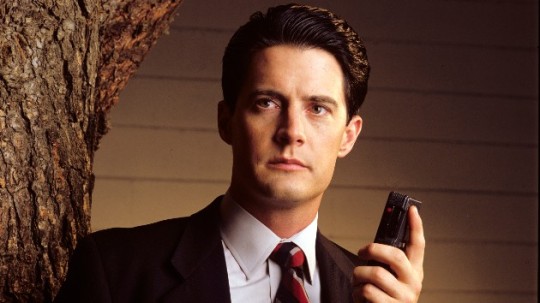
5. BRENT SPINER as DATA - I think ST: TNG had been airing for a while before I stumbled across it but I quickly became hooked and Data was my favourite character right from the start. I definitely remember at one point buying an (unofficial) episode guide book so that I could look up which episodes were good Data-focused ones (especially ones where he got hurt! :D) so I could go out and buy the videos that had those episodes on (at the time the show was available to buy on VHS-tape with 2 episodes on each tape).
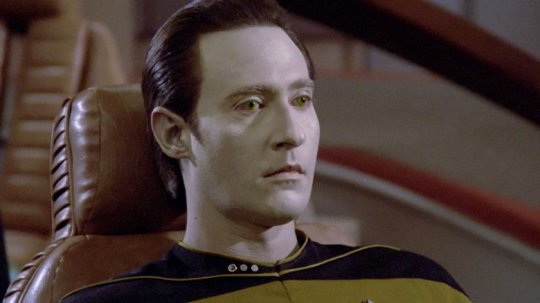
6. DAVID DUCHOVNY as FOX MULDER - Another show that I heard the buzz about and started watching right from the start and, like so many others, I immediately developed a crush on the snarky, enigmatic, troubled FBI agent with the weird name. The X-Files was the first show I ever tried writing (one, never-finished) fanfic for.
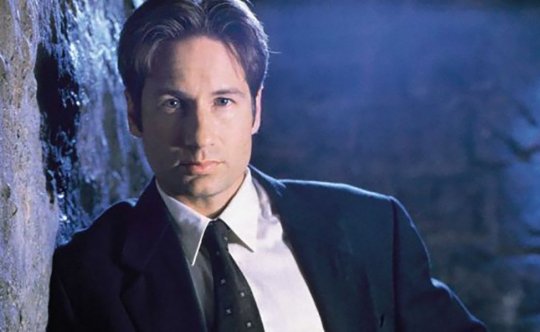
7. PAUL GROSS as BENTON FRASER - Man, Due South was such a good show! It was so quirky and clever and funny and Benton Fraser, with his huge heart and his serious demeanour and his gorgeous blue eyes, was just so darn attractive! He also got whumped a fair bit too! :D Due South was also the show that introduced me to the music of Sarah McLachlan (I was enough of a fan that I bought the show soundtrack on CD).
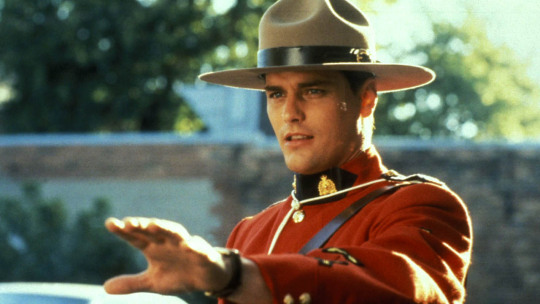
8. HUGH LAURIE as DR GREGORY HOUSE - This was a bit of an odd one for me because I had grown up knowing Hugh Laurie solely as a comedian/comic actor, known mostly for playing buffoons and genial idiots. And suddenly here he was with stubble, an American accent, and a limp, and he was hawt AF! :D It caused quite the feedback loop in my brain for a while which pretty much went “Wow, House is hot.... but it’s Hugh Laurie... but he’s hot... but it’s HUGH LAURIE!!1!”
I *loved* House (the first few seasons, at least) and oof a character with persistent pain (and a self-destructive streak a mile wide!) was a whumper’s dream. House was the first show for which I wrote - and published online - completed fanfics.
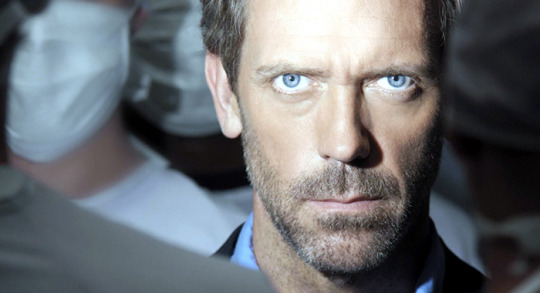
8. JOE FLANIGAN as JOHN SHEPPARD - Stargate Atlantis was my first proper online fandom, the first show I prolifically and repeatedly wrote fanfic for, and the first time I ever met in person an actor I was a big fan of (and while the show was still airing, to boot!). It was also my first introduction to the online community of whumpers! A bunch of us from the Shep Whump thread on Gateworld heard that Joe was going to be at a convention in London and we decided to book hotel rooms and meet up and go to the convention together and it was AWESOME! I can still remember seeing Joe *in person* for the first time and just,,,, struggling to believe he was actually here, in person, in front of me! He was super super lovely and humble too and took time to chat to everyone at the signing table and I clearly remember my brain just pretty much fritzing out during the photo session and being intensely aware of the sensation of Joe’s hand on my shoulder....
It was also super lovely to meet fellow fans, and online friends, in person for the first time and we had so much fun, and it kickstarted me going to lots of other conventions, including specific Stargate/SGA ones where I got to know lots of other lovely fans and online friends. I’ve met Joe about 4 or 5 times in total now and he’s been lovely every time.
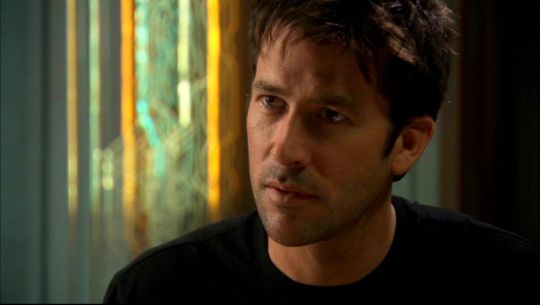
9. PAUL BLACKTHORNE as HARRY DRESDEN - Gosh I loved the shortlived tv adaptation of The Dresden Files. I loved the fantasy aspect, the stories, the humour, and I especially loved Harry Dresden and how often he got whumped! :D
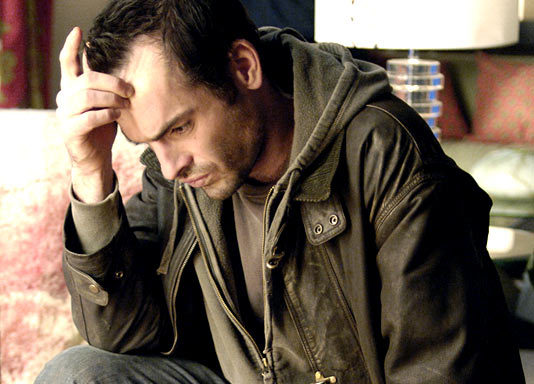
10. DAVID TENNANT as THE 10TH DOCTOR - I had watched the Christopher Ecclestone revival of Doctor Who and enjoyed it well enough but I can clearly remember watching David Tennant’s first episode as The Doctor - on Christmas Day, at my brother-in-law’s house - and being aware, as I watched it that... ooookay, yes, I’m in trouble here... I like him... I like him a lot... :D I mean, I’m sure the fact that he got whumped so thoroughly in his very first episode had nothing to do with how quickly I fell for him... right? :)
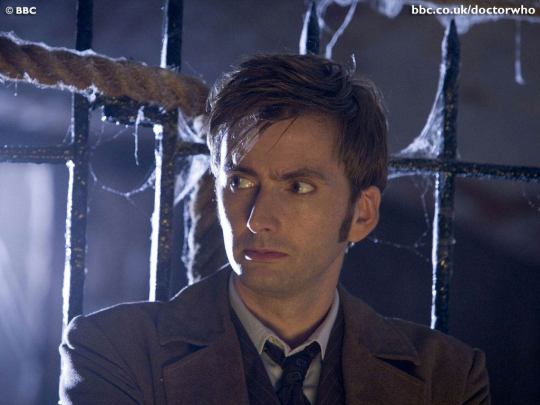
11. ALEX O’LAUGHLIN as MICK ST JOHN - Another show that ended far too soon and just as it was getting *seriously* good. But also a prime example of my point about having a crush on the character not the actor. I looooooved Alex as Mick St John... and yet in Hawaii 5.0 he pretty much does nothing for me (the character is too stoic and the whump often too unrealistically glossed over). Anyway, in Moonlight he was my favourite kind of character - angsty, brooding, dangerous AF when he needed to be... and essentially immortal so you could whump the heck out of him and he’d recover so you could whump him again! :D
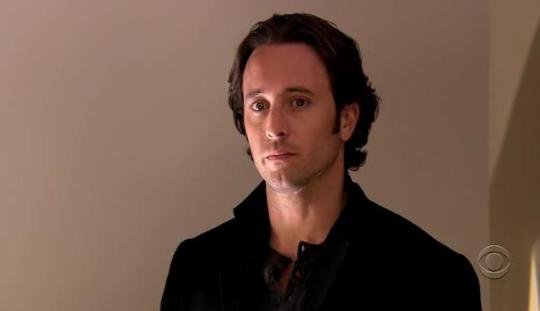
12. SIMON BAKER as PATRICK JANE - There is so much to love about Patrick Jane... his smarts, his sass, his angst... and Simon is a rare “against type” blonde crush for me (you may have noticed by now that most of my crushes follow a similar physical aesthetic - tall, slim/wiry, and dark-haired) and again here I think my crush is almost all to do with the character rather than the actor.

12. BENEDICT CUMBERBATCH as SHERLOCK HOLMES - I’m almost ashamed to admit it, given the clusterfuck that both the show and its fandom became, but in the earlier seasons I had quite the crush on Benedict’s Sherlock (and okay, a little bit on Benedict himself - I did definitely enjoy some of his other roles too). It helps that I was already a huge fan of the Sherlock Holmes character (I’ve read all the stories and novels multiple times and was a big fan of the Granada adaptation starring Jeremy Brett - whose Holmes would definitely count as one of my more minor/passing crushes) already. Benedict is another crush that I have met in person, at a (actually, the first!) Sherlock convention and he was lovely in person - very genuine, very articulate and thoughtful.
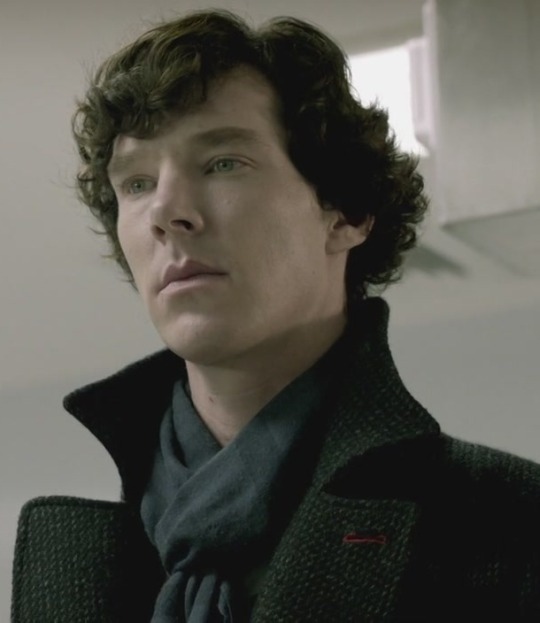
13. TOM MISON as ICHABOD CRANE - I was excited for Sleepy Hollow as soon as I heard about it and I was SUCH a fan for the first couple of seasons (before TPTB completely destroyed it and it inevitably got cancelled (I didn’t even watch the last season and a half)) and Tom’s Ichabod (and his amazing chemistry with Nicole’s Abbie) was a large part of why. I also quickly became a big fan of Tom himself as he came across as so witty and self-deprecating and *fun* in all the behind the scenes/convention clips etc. I was lucky enough to also meet Tom at a convention and he genuinely is that witty and charming and lovely.
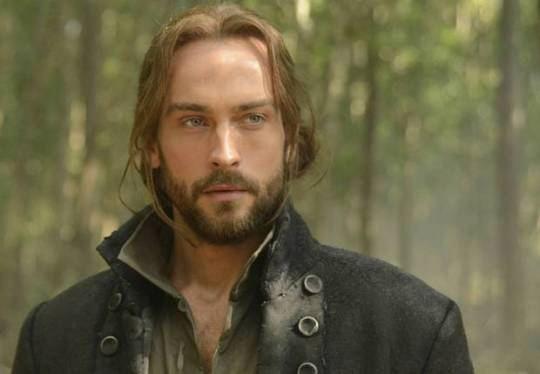
14. TOM WISDOM as ARCHANGEL MICHAEL - I think Dominion was possibly the first show that I got sucked into by seeing whumpy gifsets on tumblr! :D It was such a great show and also to date the most immersive, welcoming, cast-and-crew-interactive fandom I have ever been in. The cast and crew regularly live-tweeted the episodes, and interacted with fans on Twitter, and it was SO much fun. And Tom’s Michael was my favourite character right from the start - seemingly aloof but so much going on under the surface... and some really nice whump, especially in season 2! I was heartbroken when it was cancelled after only 2 seasons (and just as the plot was getting *really* interesting).

15. OLIVER JACKSON-COHEN as LUCAS - I was hooked on Emerald City right from the first episode. It was visually stunning, so atmospheric, and really intruiging. I love love loved Adria Arjona’s Dorothy (ngl, I had a bit of a crush on her too) and she and Lucas together were just... *chef’s kiss*. I mean... what an introduction to a character... she finds him crucified, bleeding, his wrists tied with barbed wire, and amnesiac.... and the whump only gets better and better from there on in! Like the entire first two episodes are just... Lucas whump! :D And his devotion to her... Emerald City was honestly the first show where I really got into a ship. I was *invested* in Dorcas, dammit! Aaaand sadly another excellent show that never made it past its first season.
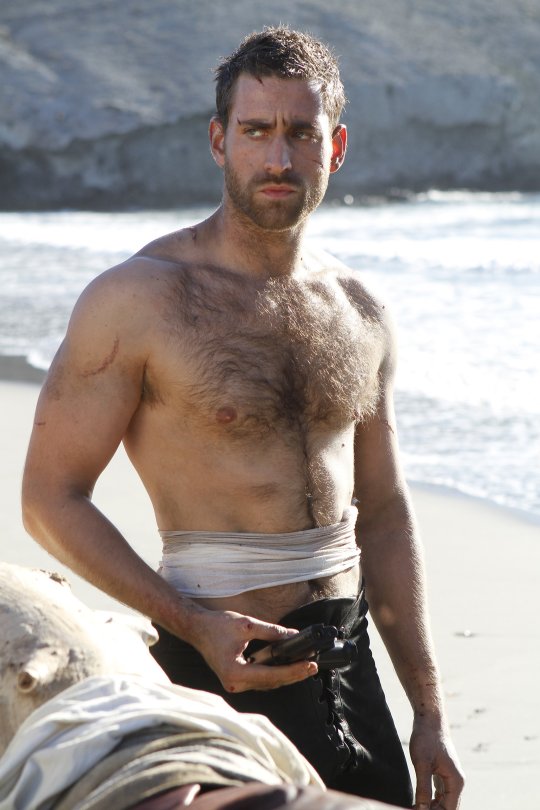
16. JASON RALPH as QUENTIN COLDWATER - Another show that I watched right from the start, was heavily invested in.... and that the writers absolutely tanked and destroyed in later seasons. *cries* Quentin was such a brilliant viewpoint character for the show and I loved his awkwardness, and his angst, and his enthusiasm, and his adorable floppy hair... and how often he got whumped!

17. COLIN MORGAN - I fell for Colin in Merlin (which I stumbled upon late, long after it had finished airing, and hence was able to binge-watch the entire 5 seasons!) and liked him enough to seek out his other works, such as The Fall, and Humans, and The Living and the Dead, and he was brilliant (and very pretty) in all of them... and his characters also seem to get whumped quite a lot! :D
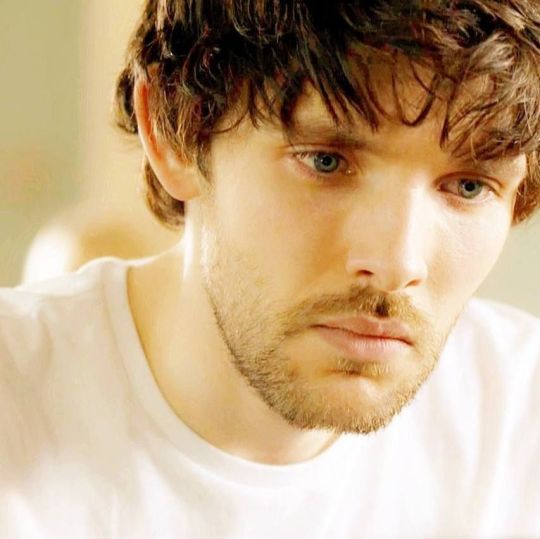
18. MATT LANTER as WYATT LOGAN - Wyatt was another of my favourite archetypes... absolutely badass and competent... but also tortured and angsty and capable of intense devotion. Another show that I watched because of whumpy gifs on tumblr and the second ever show where I actually got invested in a ship - Lyatt all the way, baby!! :D - aaaaaand yet another show cancelled before its time.
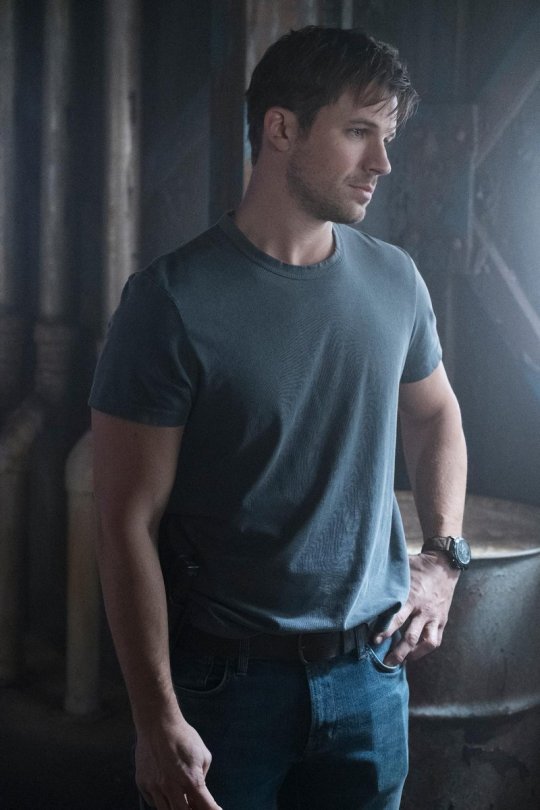
19. NOCTIS LUCIS CAELUM from FINAL FANTASY XV - my very first video game crush! I was recommended to play FFXV by fellow whumpers on the whumpshire discord because it was whumpy... and they were not wrong and I loved the game and I absolutely adored Noctis. FFXV is one of very very VERY few video games that I have actually played right through to the end. And possibly the only video game that has ever affected me to such an extent... I became so invested in the characters and their world and I actually found the last couple of chapters really hard to play because it was actually upsetting me emotionally. I had to take a break for a couple of weeks before I could go back and finish it!

20. CONNOR from DETROIT BECOME HUMAN - and from there I jumped straight into another video game crush! DBH was another game recommended to me for its whump potential and I, and many others, immediately fell in love with the quirky, sassy, self-sacrificing (if you play the game right!) “android sent by Cyberlife”. The game itself is really good too... although, I have tried to play through all the different endings to the story but have never yet managed to make myself play the machine Connor storyline.... I want to complete all the story branches... but I also just want Hank and Connor to be friends and to be happy! :D
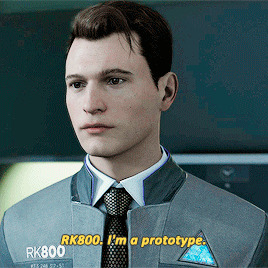
21. ZHU YILONG - Ahhh... the beginning of the asian drama arc of my fandom life! I first came across Zhu Yilong after getting sucked into watching Guardian because of pretty (and whumpy) gifs on tumblr... and I’ve never looked back. He is one of the rare entries where I am pretty much guaranteed to like him in pretty much anything he does and my crush extends beyond Shen Wei, or his other characters, and into reblogging his fashion shoot photos, and keeping up with news of his work in general. He’s just... so darn pretty! And also so... blur! :D And the behind the scenes stuff and interviews of him with Bai Yu, during the Guardian era, just made me fall for him all the more. He’s also ridiculously talented - not only a fantastic actor, but a really good singer (I love his singing voice), he plays guitar and piano, and he can paint too!!
He’s also pretty much what made me start learning Chinese... because after Guardian I went seeking his other dramas to watch... only to find that many of them are only partially, or not at all, subbed. So I thought... why not try learning Chinese and then I’ll be able to watch his other shows? :D

21. JI CHANG WOOK - My first kdrama crush, and what a good one to start with! Healer was the first drama I ever watched and can you blame me for falling for JCW... especially when I followed up Healer with The K2?! I’ve liked him in pretty much everything I’ve watched him in. Although I do wish he would go back to doing more action-based shows as he is sooo good at them... but he seems to prefer the romcom genre these days, which is something I am nottt always a fan of tbh.

22. JAKE HSU as MENG SHAO FEI - Yet another show that I got sucked into by tumblr - and also one with a great, fun fandom through which I met lots of lovely people who I still follow/am mutuals with to this day. I just *adored* Jake’s character in History and I also loved the ship - Tang Fan and Meng Shaofei were awesome and adorable together and I was totally invested in both the ship and the gangster/cop/what happened years ago story happening alongside the ship. And Jake is just all kinds of cute.

23. XIAO ZHAN - Aaaand we are pretty much up to current day now... where The Untamed took over my life in the summer of 2019 and has yet to let me go. Xiao Zhan is another disgustingly talented human being - a fantastic singer and a really good actor, and also an artist - and he also just comes across as a genuinely sweet and charming person, and a very thoughful and earnest one too. And lbr he is ridiculously pretty, and his smile is just pure sunshine.
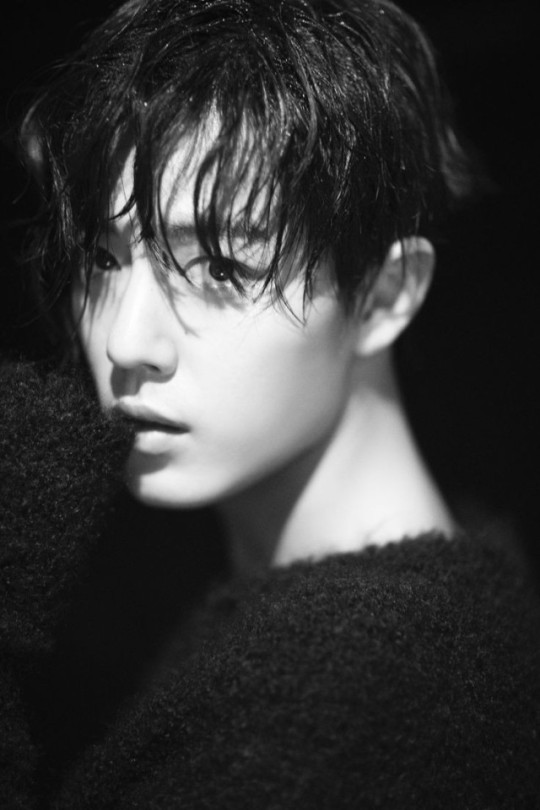
24. LEE DONG WOOK as LEE YEON - The most recent entry to the charts.... a Korean actor I was aware of but whose work I hadn’t watched and whose looks didn’t particularly seem to grab me... until I watched Tale of the Nine Tailed and fell head over heels for Lee Yeon (and daaayum does red hair suit LDW!!) and very quickly began to find LDW’s looks very appealing (and oh my, does Lee Yeon whump well!!). And yes, I have now started watching Goblin. :D

Phew! Aaaand we are done! I’ll admit, I did think of a few more as I was compiling this list but I decided to categorise them as more “minor” crushes and not include them... otherwise we really could be here all day!!
I’m going to tag: @sarah-yyy, @arlothia, @howdydowdy, @thepromiseweheldforlife and @the-wandering-whumper!
10 notes
·
View notes
Note
Essay person here again: yes! I’m so worried Hillary and Kamala and Nancy are all going to be brushed under the carpet, or only remembered as ‘the first’ or as adjuncts to men rather than their own achievements. My tutor is supposed to be an expert on modern women’s history in America and she knew hardly anything about Nancy in particular, which I found appalling. I remember reading somewhere about how often historians try to ‘fill in the gaps’ by trying to find out about women’s rights movements or women’s lifestyles instead of focusing on actual women who made progress and made women’s lives better, and as such they just get forgotten and written completely out of history, or will only be remembered for their ‘failures’ or as adjuncts to men, and I suppose we’re just watching it in real time unfortunately. I see it happening in the U.K. too, with Barbara Castle seemingly being forgotten about in the textbooks I have to read/reference, even tho she did so much in her lifetime.
The erasure of consequential women seems an all too common occurance, especially in politics. It has happened to Mo Mowlam too - the woman who helped broker the Good Friday Agreement in Northern Ireland that ended the civil war has vanished from most accounts of that historic moment. It’s nearly always the men you hear about - Mo’s role has now been enveloped by the umbrella term “British government”, which fails to recognise that actually it was her arrival that moved the whole peace process into a completely different gear. Thatcher is of course the one notable exception to erasure, purely because she was around for so long, so completely changed the country she governed as to be an ism, and has featured as a part in movies/tv etc, all of which makes her pretty impossible to ignore, but other women despite their political achievements don’t seem to warrant a write up. It’s almost like Thatcher is a placeholder for all women within politics despite being the most divisive, with the least positive legacy, and the one most easy to parody or mock because of her mannerisms (maybe that is why they choose to make her the default example of women in power...). I mean when you think about it, how often do we hear about Indira Gandhi, Golda Meir, or Benazir Bhutto. We now live in a time when women are very much breaking down the barriers in politics more and more. Women are getting harder and harder to ignore. The test is going to be what happens to Angela Merkel. She doesn’t have an ism based on her policies, but she’s been around as long as Thatcher, and in terms of her power and influence, is probably much more of a force. Can the woman who held Europe together be brushed under the carpet after September?
One of the things that absolutely infuriates me about how Nancy is talked about is her adjunct to Obama. Yes, they managed a lot together, and I have no doubt it helps when the president is from the same party, but she got some big progressive legislation into law under Bush too, especially on the climate, which is a hell of an achievement, and no one talks about that. One of the really good things about the Ball book about Nancy is how much it underscores how so many of Obama’s percieved achievements actually came about because of Nancy and her political maneuvering. She pretty much made his agenda happen (which with the greatest of respect to the 44th president, was actually her agenda for years before he came along), and whilst it’s fair to credit him with some of it, at the end of the day it was Nancy who gathered the votes. There’s a really great passage in the book about her making the pitch for the revised ACA with the more conservative abortion language that had been shoved into it by moderates listening to bishops - she hated it but she knew that there was no way the bill would pass without it and those moderate votes, and so she made the pitch. Everyone in the committee room was crying, she made the pitch, and she got the votes. She got those votes, not Obama. The ACA is PelosiCare if we’re talking about who did the ugly work of making it happen.
There’s a funny similarity in Barbara Castle and Nancy, although Barbara never made it as high in British politics (wrong place, wrong time, lack of opportunity) as Nancy has in American - but you have two women whose own ideology and thinking has been ignored and then rewritten to be the ideas of men, whilst they have either been forgotten about in Barbara’s case, or cast as some sort of flimsy sidekick or villain in Nancy’s. Everything Barbara advocated for in terms of social change in the UK has now been credited to various men within the Labour Party, and everything that Nancy advocated for and indeed achieved has been credited to Obama, or since 2016 Saint Bernie. I would say that Barbara was probably a lot less polite about how she went about things than Nancy is, but both held/hold passionate left wing views coupled with pragmatism about how things could/can be achieved (had Castle been allowed to implement her unions bill “In Place of Strife” back in the 70s, it’s probably fair to say that Thatcher wouldn’t have managed to decimate them as much as she did in the 80s). Here’s the real kicker - Barbara Castle introduced the speed limit, seatbelts, and the breathalyser to the UK’s traffic laws, Nancy Pelosi passed the ACA. Those two women have saved more lives with those laws than any man.
3 notes
·
View notes
Text
9 Tips to be a Better Leader - Leadership Life Coaching Skills
New Post has been published on https://personalcoachingcenter.com/9-tips-to-be-a-better-leader-leadership-life-coaching-skills/
9 Tips to be a Better Leader - Leadership Life Coaching Skills
Today I am, going to be teaching you some tips on how to be a great leader. So one of the biggest misconceptions about leadership is that it is something that is innate.
Many people think that leaders are born. This way, and they don’t have to spend time and effort to develop their leadership capabilities. This cannot be any further from the truth. By implementing the 90 words of leadership into your life, you’ll, be able to develop your potential as a leader, earn more money in your career and earn even more respect from your peers and be more fulfilled in your personal life.
NINE Leadership TIPS
So here are nine tips on how to be a better leader tip number one integrity. Integrity is the foundation of all leadership. People are not willing to follow someone whose actions are unethical or unjust.
Imagine you are working for a boss who, despite your great efforts and sacrifices for the company, gives the job promotion to employee that has been slacking off. Why would you follow such a leader? On the other hand, when we operate from integrity regain the trust of the people, we work closely with trust amongst team members is one of the most accurate predictors of success and it all starts with the leaders integrity.
Then the team members can reciprocate the behavior of the leader and create a favorable atmosphere so that everyone can benefit that number two is that actions speak louder than words. A great leader should lead by example, not delegate something to his followers not willing to do himself during World War.
One general George Patton led his troops by walking in front of the tanks, despite the risk of being easily shot by the enemies. Martin Luther King Jr, Mahatma Gandhi, were all great leaders who stood up and led by example.
You’re, not a true leader. If you are not brave enough to take the first leap practice, doing three small things were afraid of every day to get familiar with being uncomfortable. When the time comes to take charge, you’ll have built the resilience and confidence abilities.
Your friends or classmates will then see you as a powerful gifted leader, while you are enjoying the fruits of your labor tip number 3, be persuasive. The third secret to making people follow you as a leader is to become more persuasive.
Persuasion is too broad of a topic to cover in a single point, so you should definitely spend a lot of time studying it, because it will skyrocket your success, one powerful thing you can do to 10 times your persuasion when you ask someone to do something for You is to frame it so that they see the benefit they get from doing a particular thing.
If you can persuade your buddy to come work out with you, it would be wiser to show him what he will get increased confidence longer life and girls. Looking at him right, you’ve, been saying that you feel bored or unmotivated to go to the gym alone, and you need a partner tip.
Number four is to make people feel important. The billionaire Mary Kay ashes secret to building your empire would imagine that every person she met had a sign on their forehead. That said, make me feel important.
Leadership is not about the leader. It’s about the followers. According to her, this is a secret to succeed in life, but how do i make people feel important, genuinely ask them, questions about their interests, passions concerns and other things.
Don’t forget to praise and thank them on the smallest achievement. Never condemn offer constructive feedback and that will help them improve their number.
Five is depraved in public and correct and private. One of the worst thing the leader can do is to condemn someone for a mistake in front of his or her colleagues. Now you’ve ever had friends over and your parents got mad at you for something you probably felt like this not only will violate the make people feel important tool, but you will lose your respect and credibility as a leader.
Of course, we can all agree that mistake should be paid attention to and corrected in order to not be repeated, but here’s, a framework on how to give proper criticism. So the person that you were criticizing two things that they do well before criticizing them and then one after the criticism, this is called sandwich approach.
Let’s say that your colleague or business partner is 20 minutes late every morning. First, you talk to him in private and start with the praise. Then you include the criticism and again finishers of praise James.
The customer service you provide for our client is really outstanding. The fact that you’re late for work every morning is a problem for us, because our team and clients need your exceptional skills and knowledge at that time of day.
Number six is to take responsibility for your mistakes. Leader is not supposed to be perfect or not make any mistakes. Making mistakes is completely normal unless you try to cover them up, deny them or make somebody else responsible for them.
A great leader earns respect by admitting his or her mistakes and learning. The lesson vulnerability is a sign of leadership strength. It is mistakenly viewed as a weakness at number.
Seven is a have a clear goal or a vision.
Successful companies reach consensus on all of the common goals from top to the bottom of the hierarchy. Even the most brilliant strategy will fail if such consensus has not received after you have set a clear, achievable and yet, at the same time challenging goal as a leader and communicated them.
A call Emily to all of your followers were bound to achieve them. Despite the University another tip to achieve goals, be it for yourself for the organization you’re in is to write them on paper. People with written goals are 51-percent more likely to achieve the goals, then without yet only three out of a hundred volts.
Actually write their goals down according to a study in the UK. Number eight is to be knowledgeable, so this was the first tip and how to think, like Dr. House being knowledgeable as a leader is crucial in order to feel confident and gain the respect of your followers saying that you don’t know how to Do something, and asking for advice is fine, but when this happens regularly, you start to lose your leadership credibility.
You still have to have that technical information always seek out new information and try to better yourself as a person. This will inevitably make you a better leader and more valuable as a person that number nine is to surround yourself with great people.
There’s, a saying that you were the sum average of the five people you spend most of your time with no matter how great the leader is, he or she will always be limited by the potential of his employees.
Let go of the old friends or relatives that are holding a batter has a whole bunch of negativity in their life. It’s, ok to help them, but if they keep dragging down, you should probably let them go.
Surround yourself with epic people that will challenge you to make a stronger version of yourself Andrew Carnegie, attributed his success to being surrounded with people way smarter than he was in putting the brainpower to youth become one of the wealthiest men in the world.
How was Thomas Edison able to invent the light bulb without formal education. He simply use the brand of highly educated physicist and people that excelled academically in combination with his perseverance. He was able to add more than 1,000 patents to his name.
Source : Youtube
elink.io | See Original
#and be a better leader#be a better boss#be a better leader#be a leader#become a better leader#better leader#better leader prescott#better small group leader#good leader#how to be a better leader#how to be a better leader at work#how to be a better leader in school#how to be a better manager#how to be a great leader#how to be a leader#how to be a leader at work#how to become a better leader#how to become a leader#leader#learn how to manage people and be a better leader#qualities of a leader#Business Coaching#Leadership Life Coaching
5 notes
·
View notes